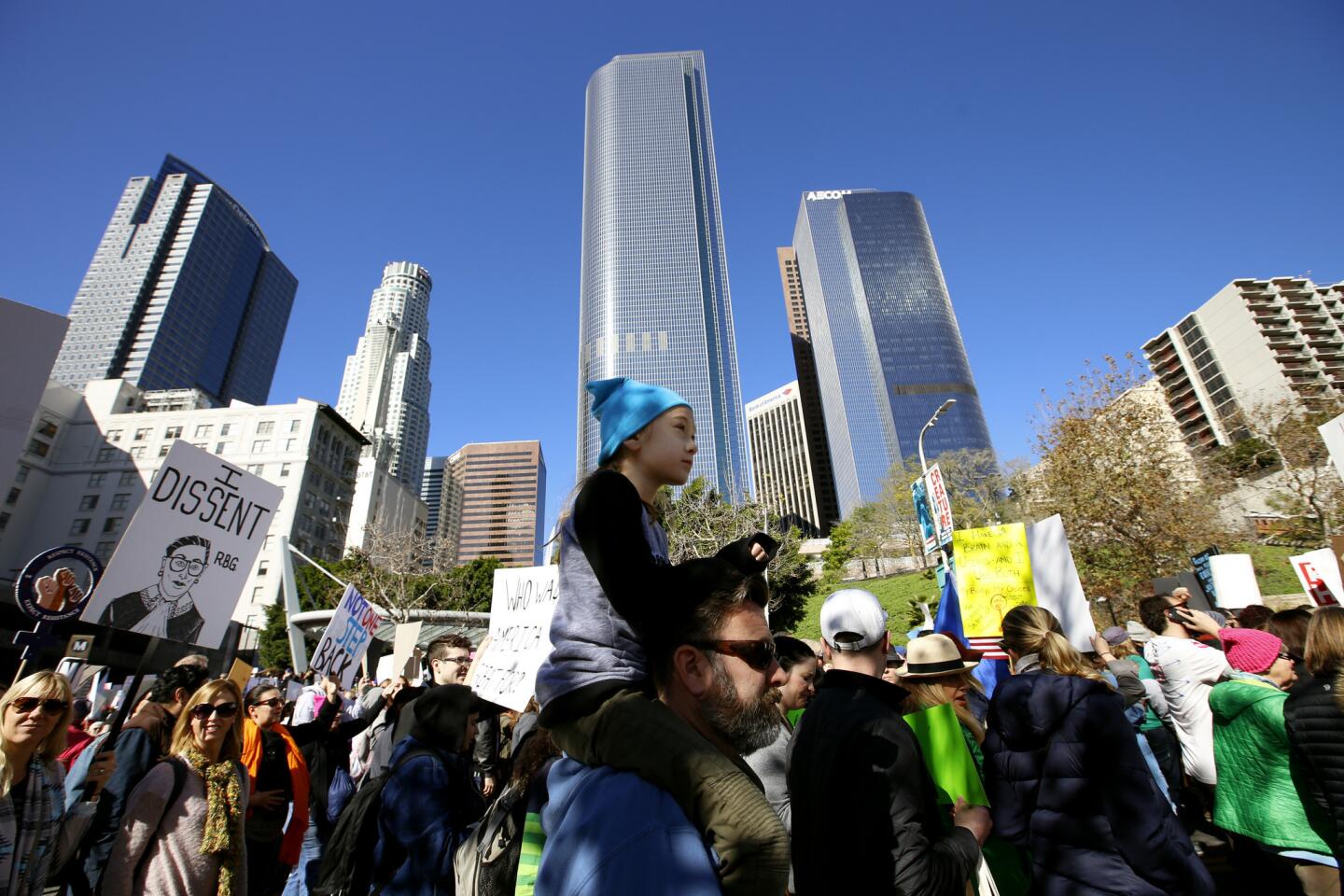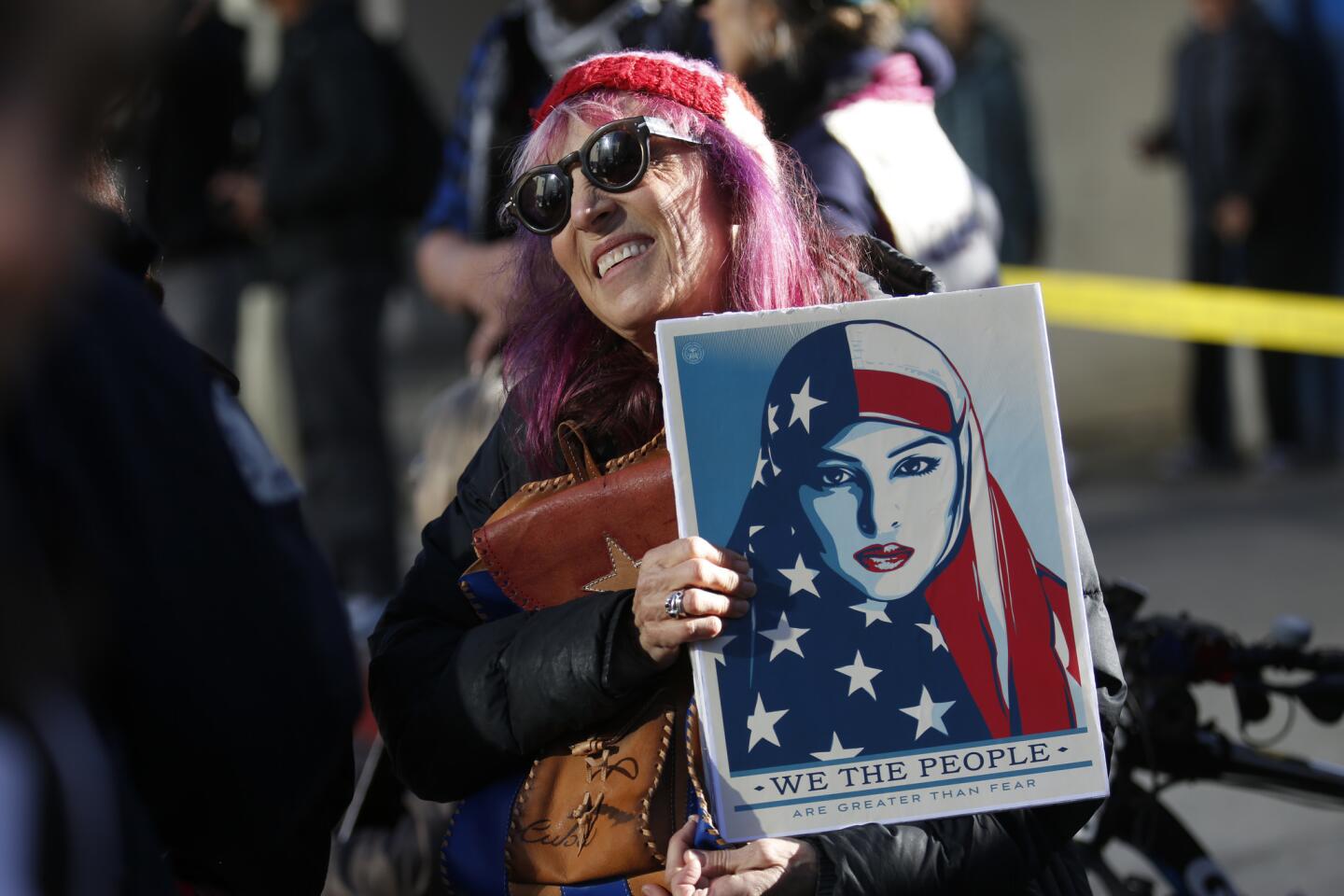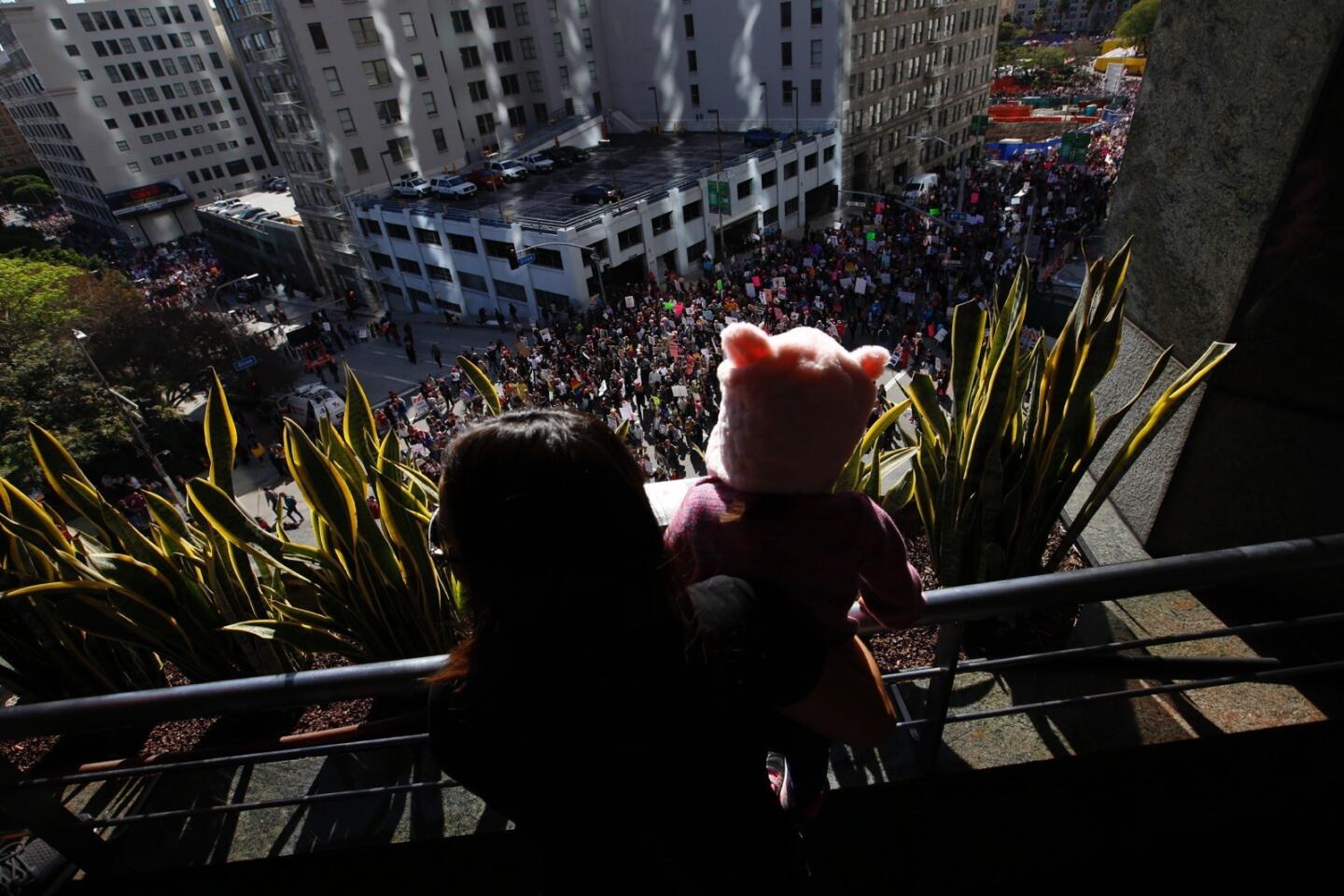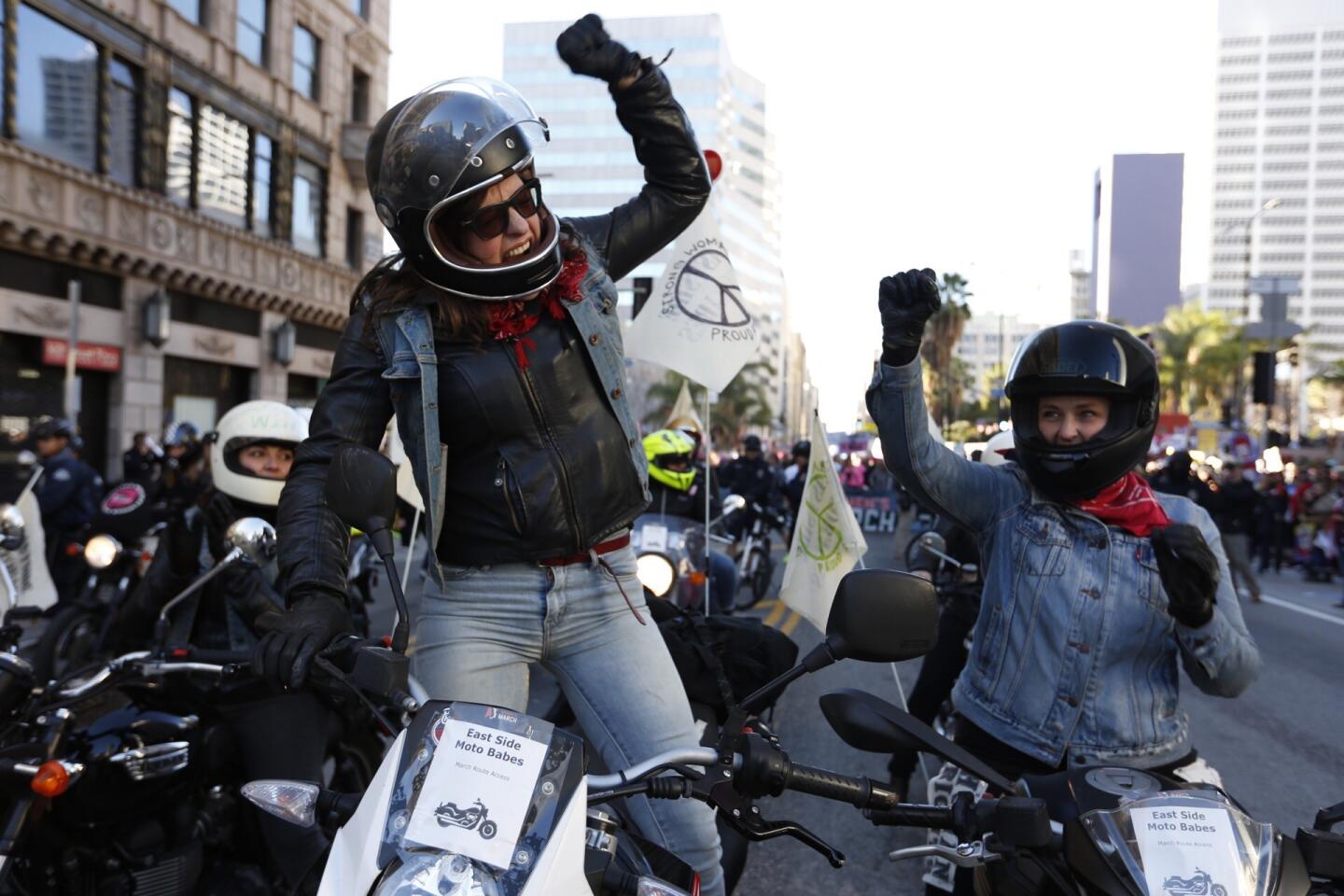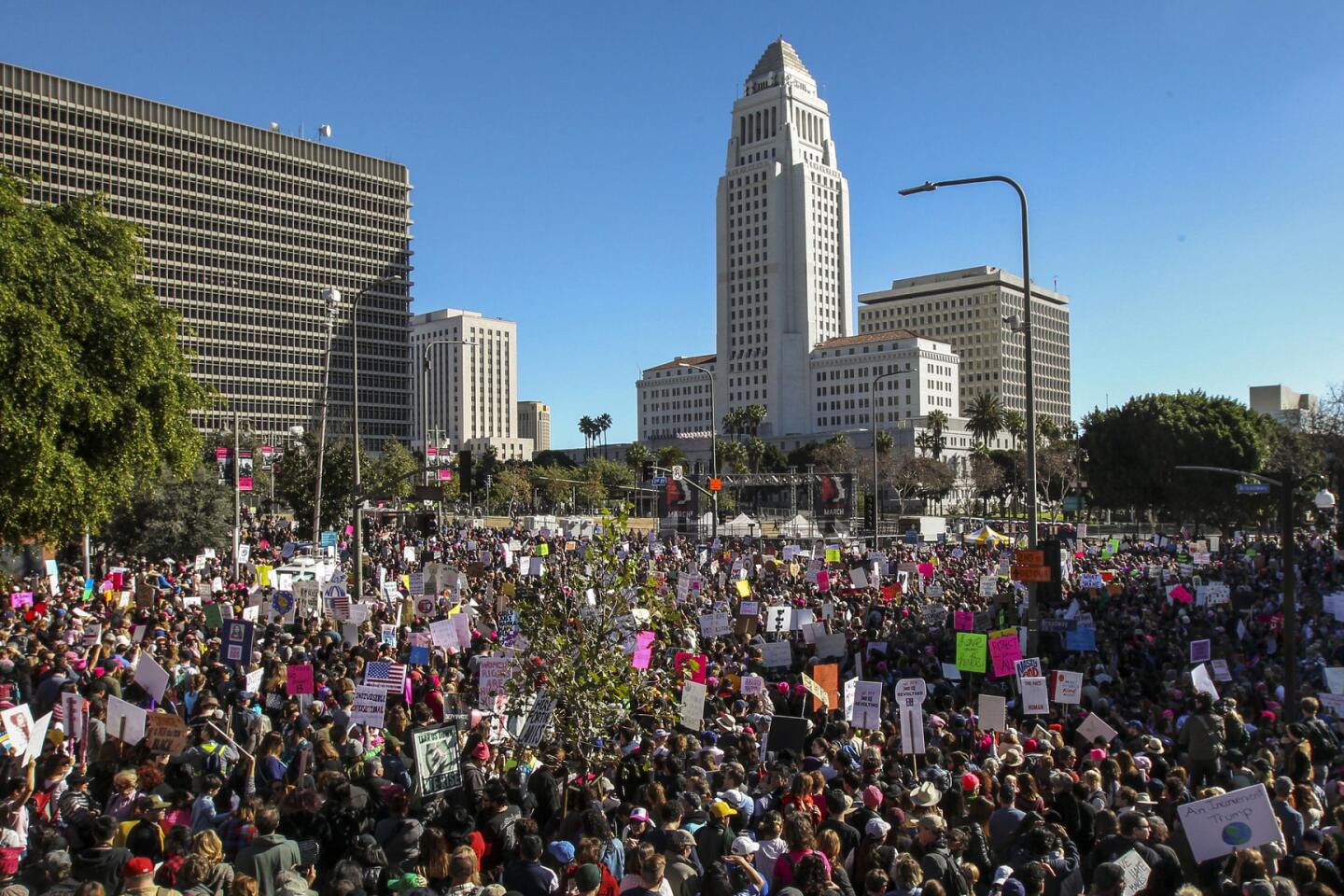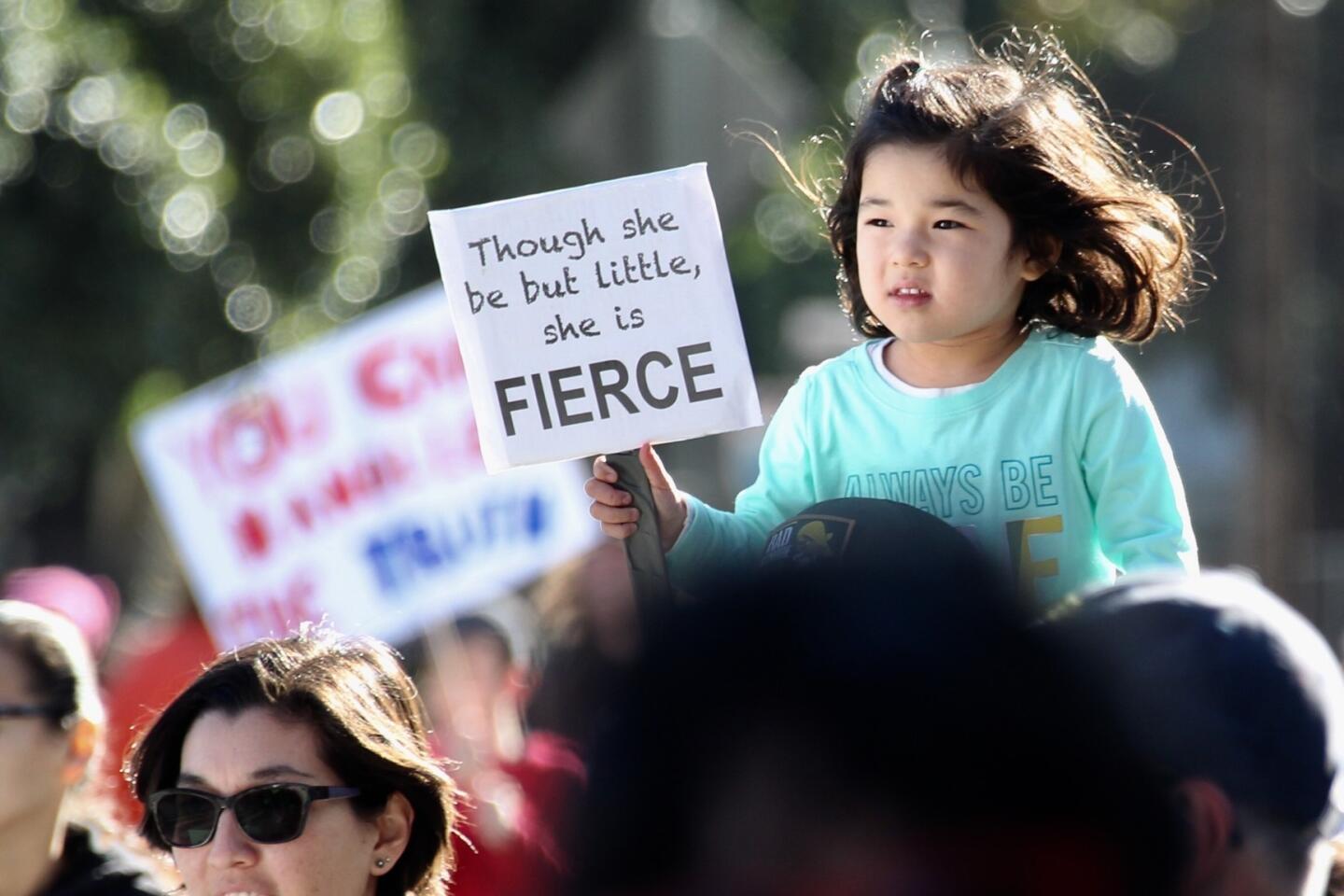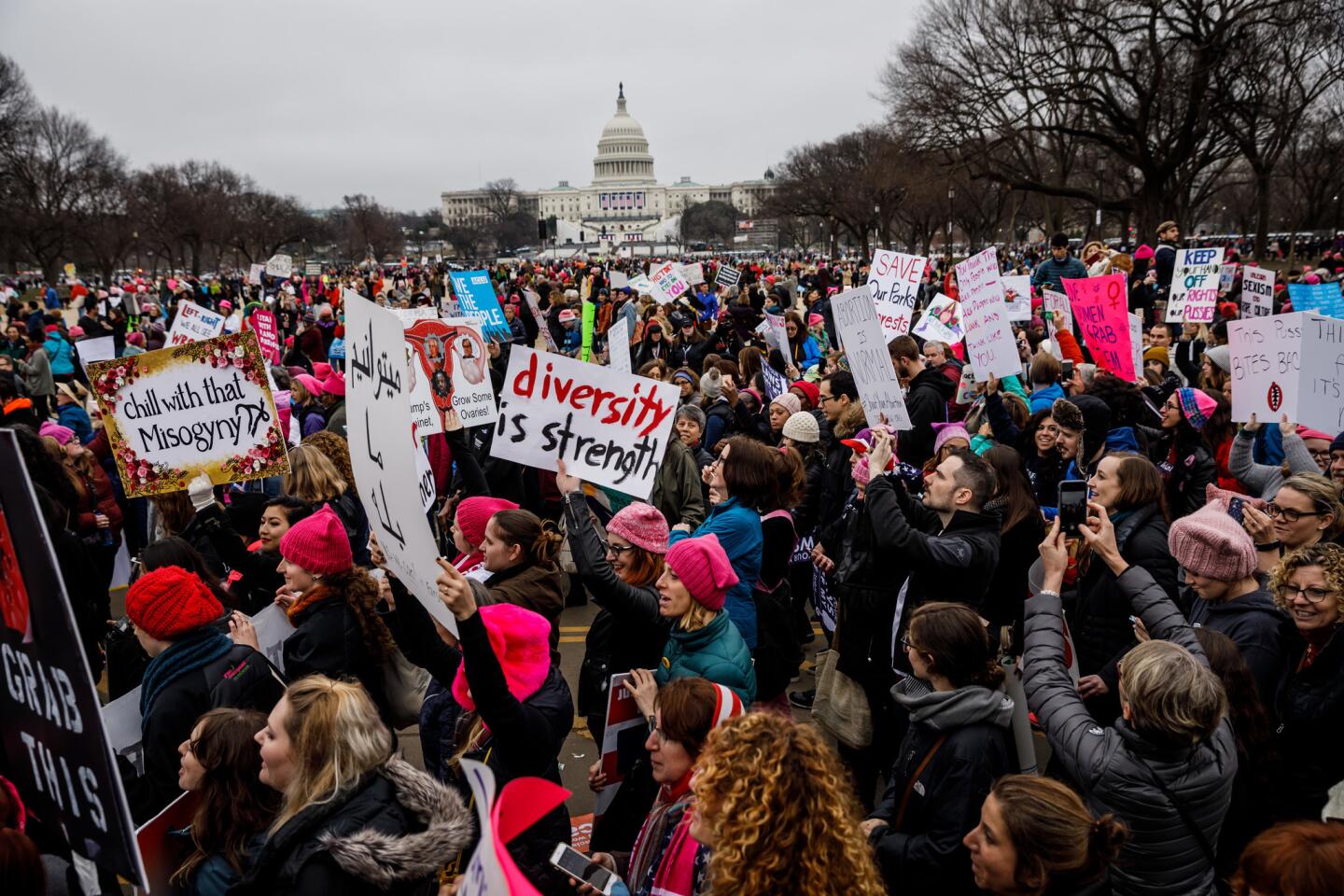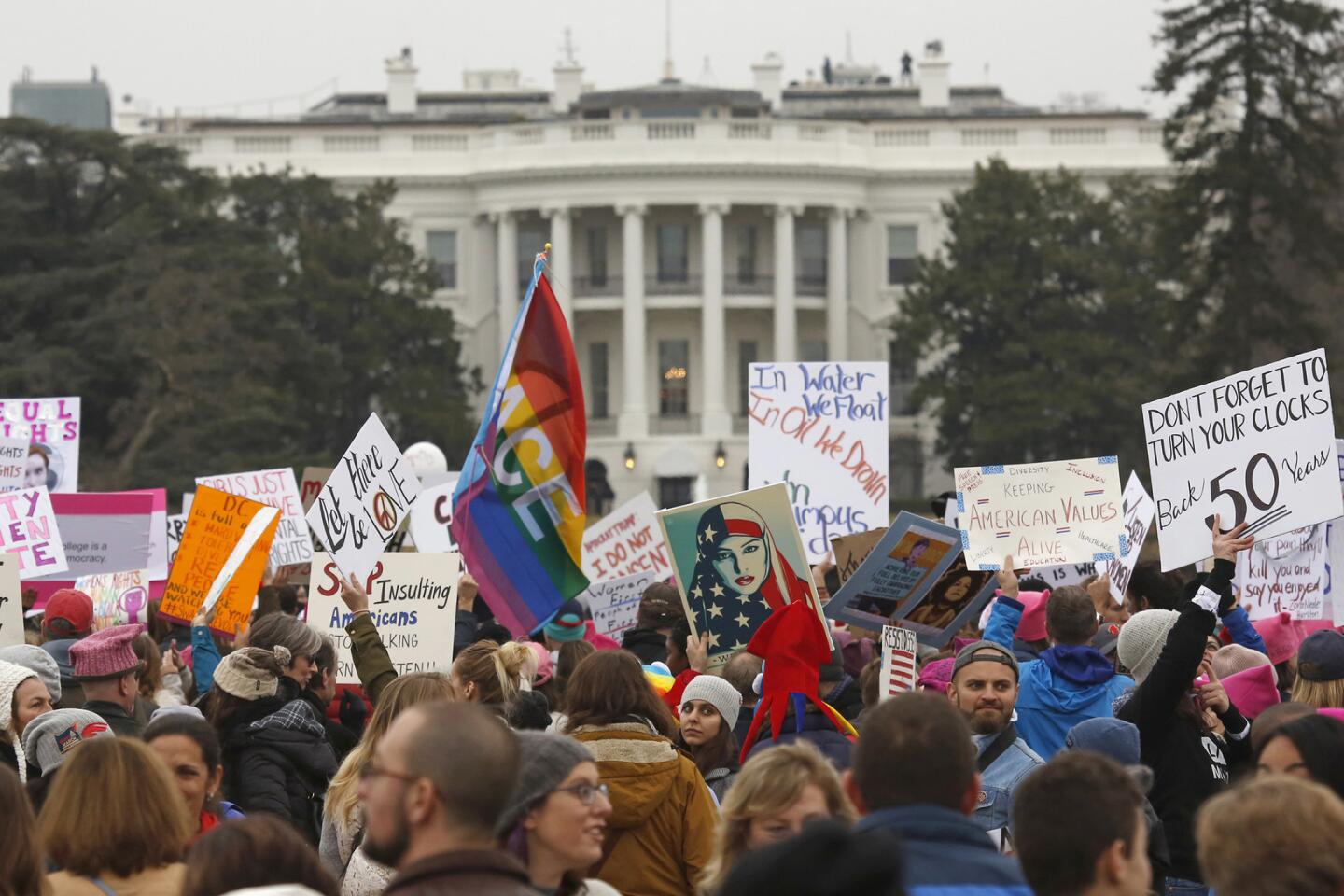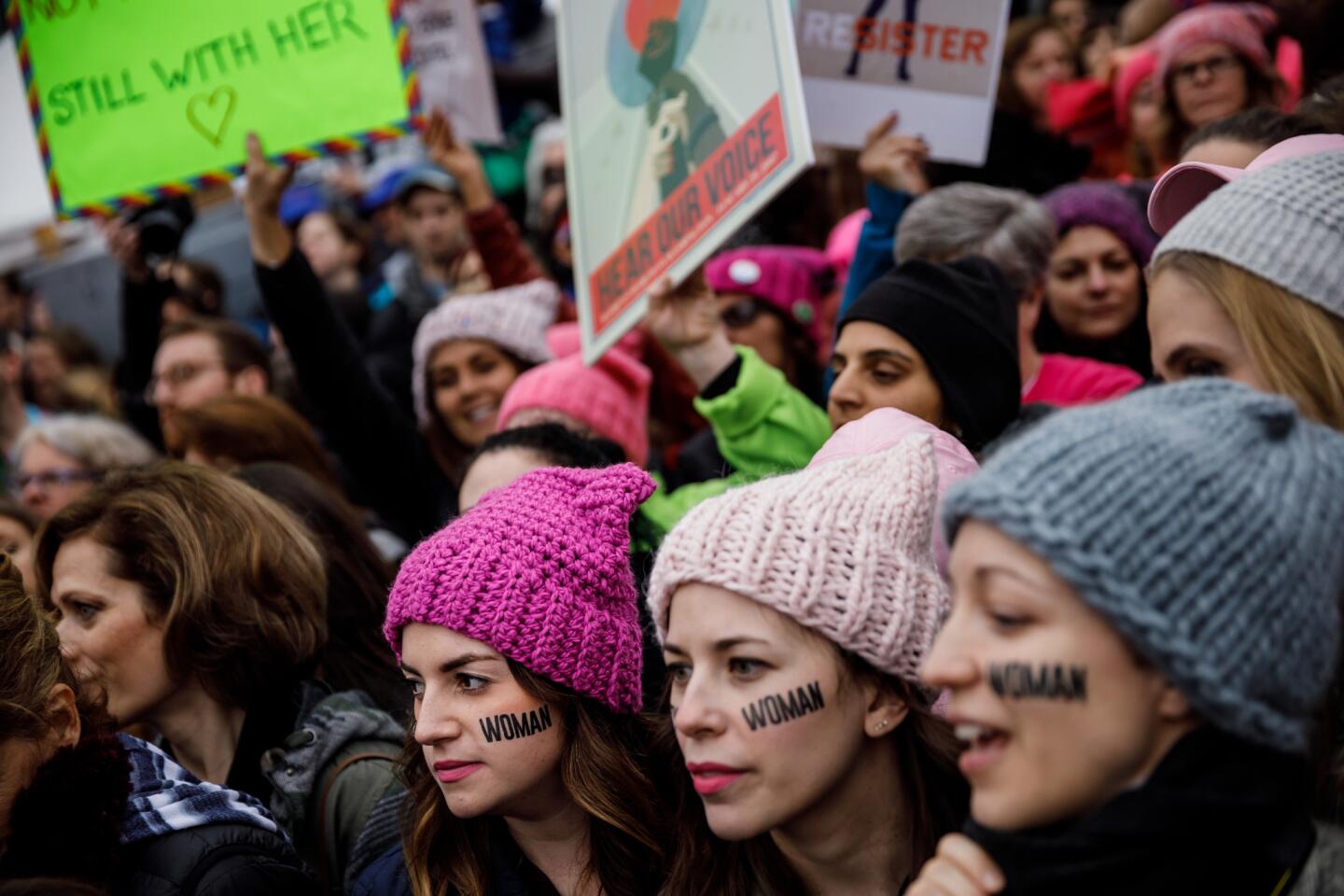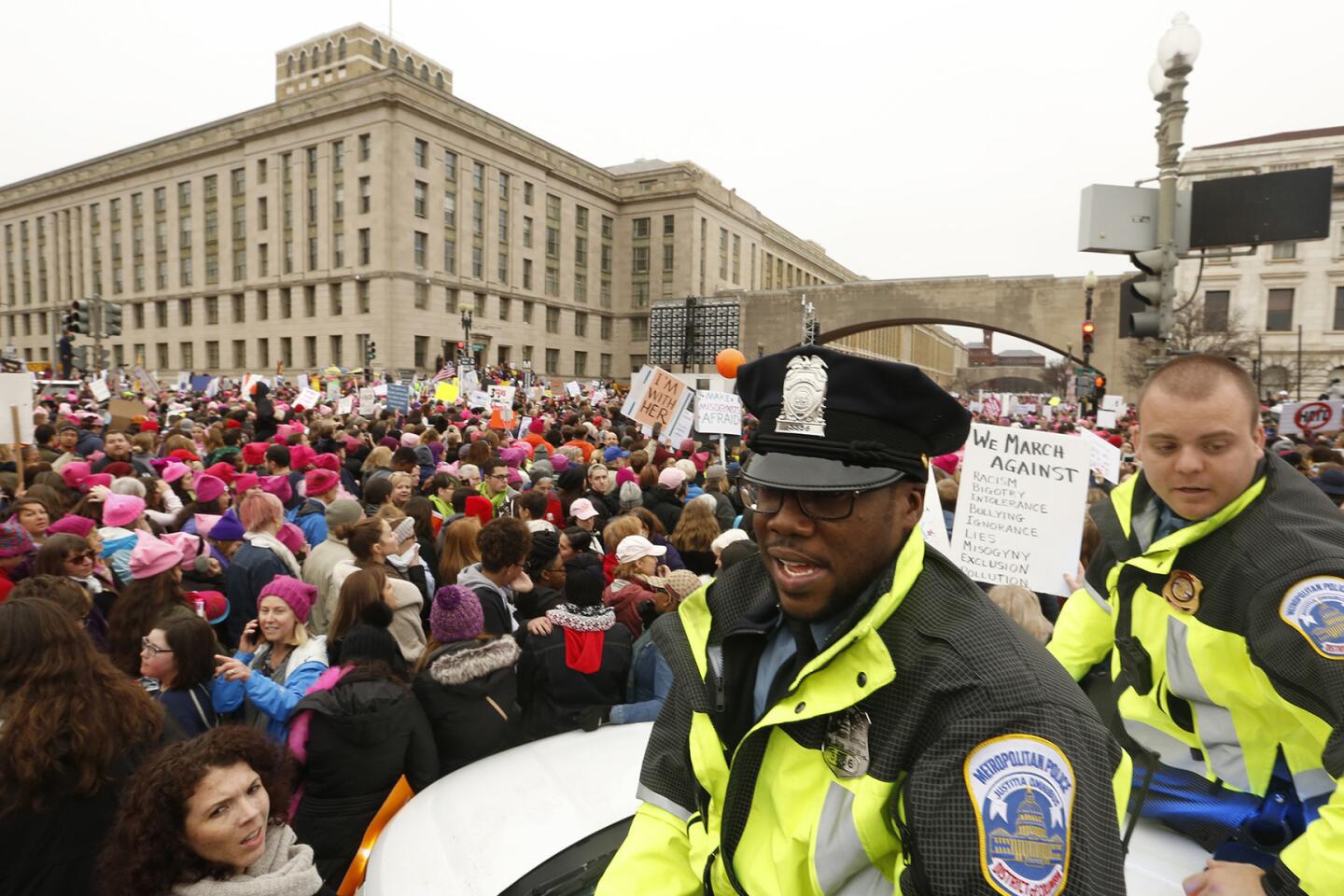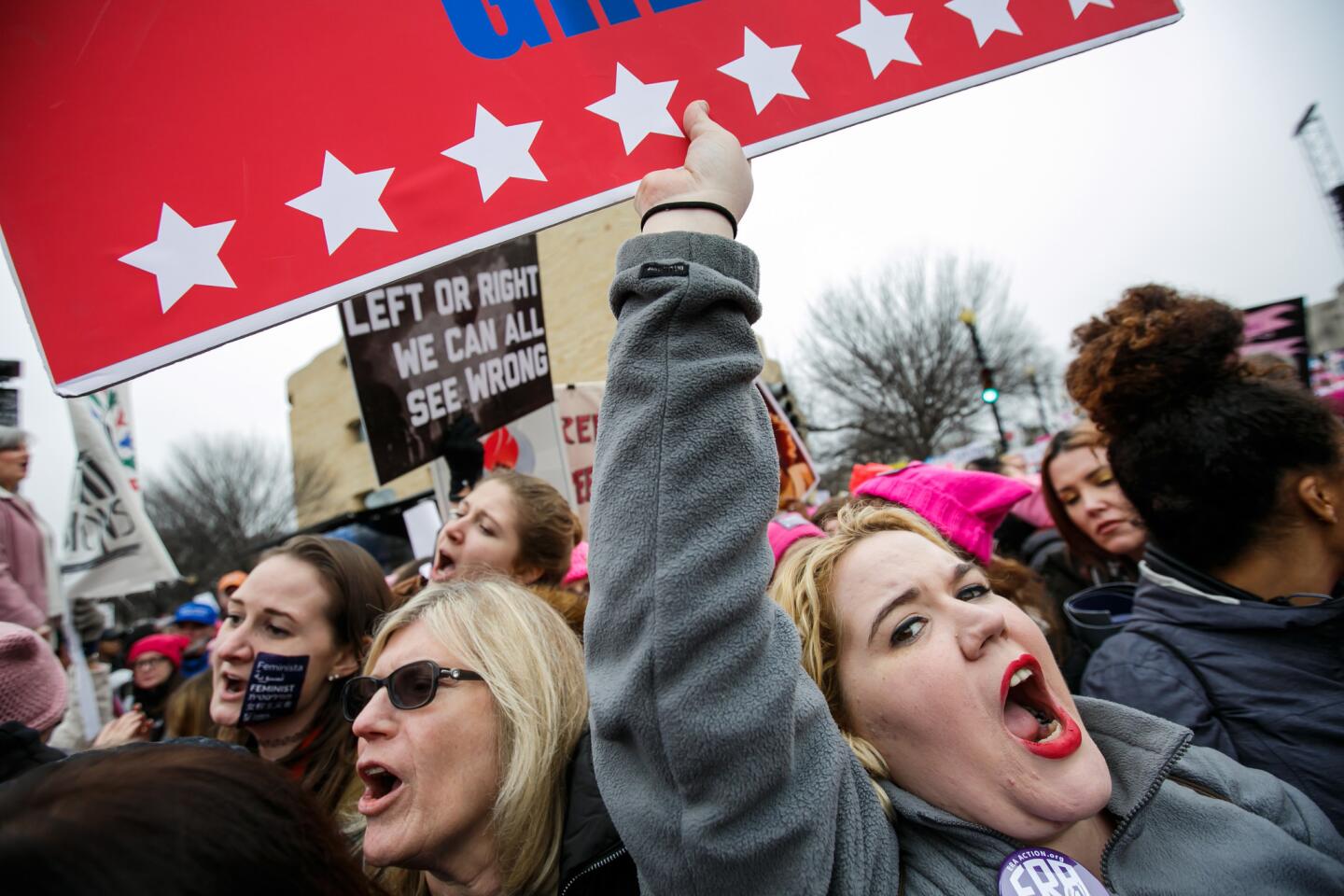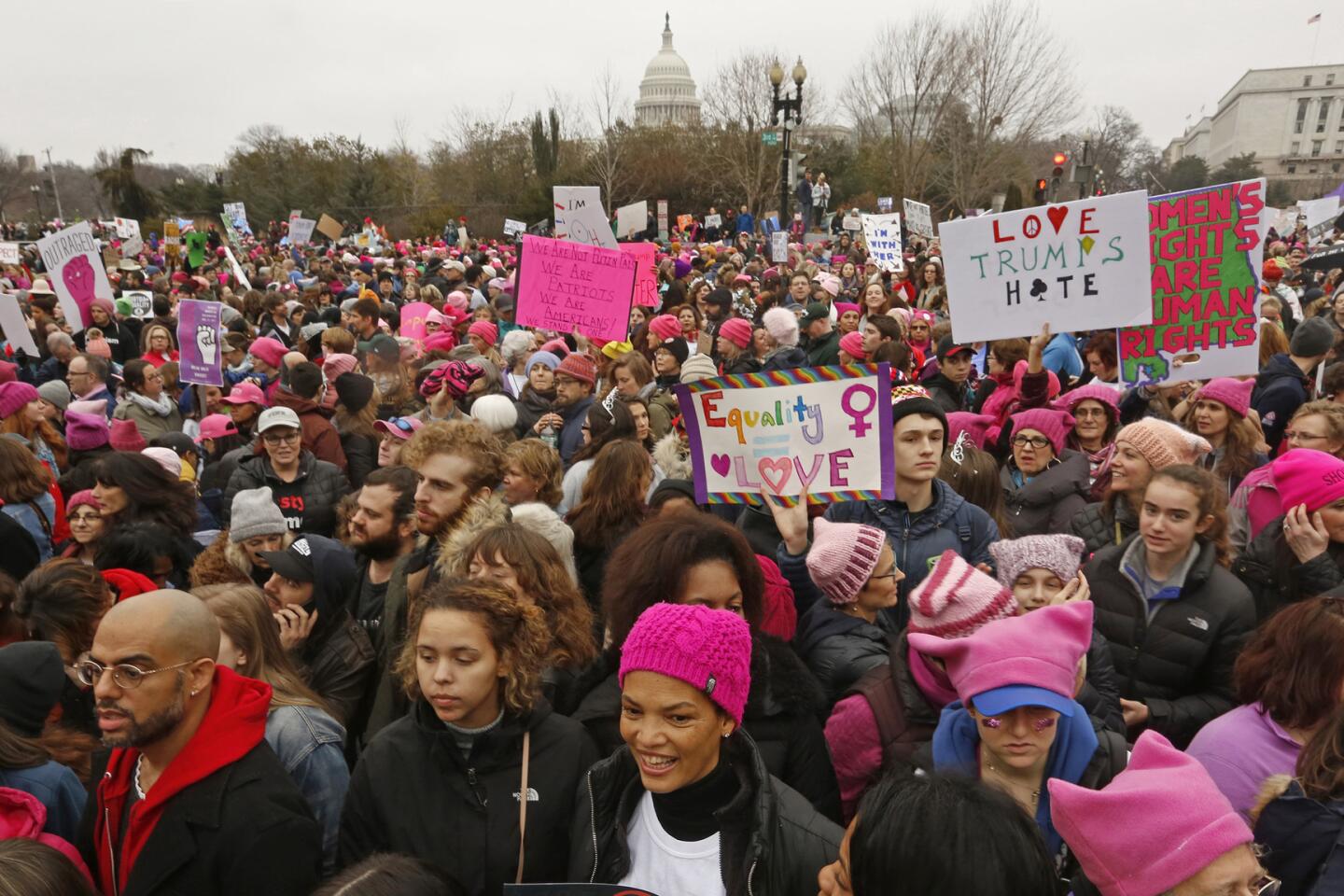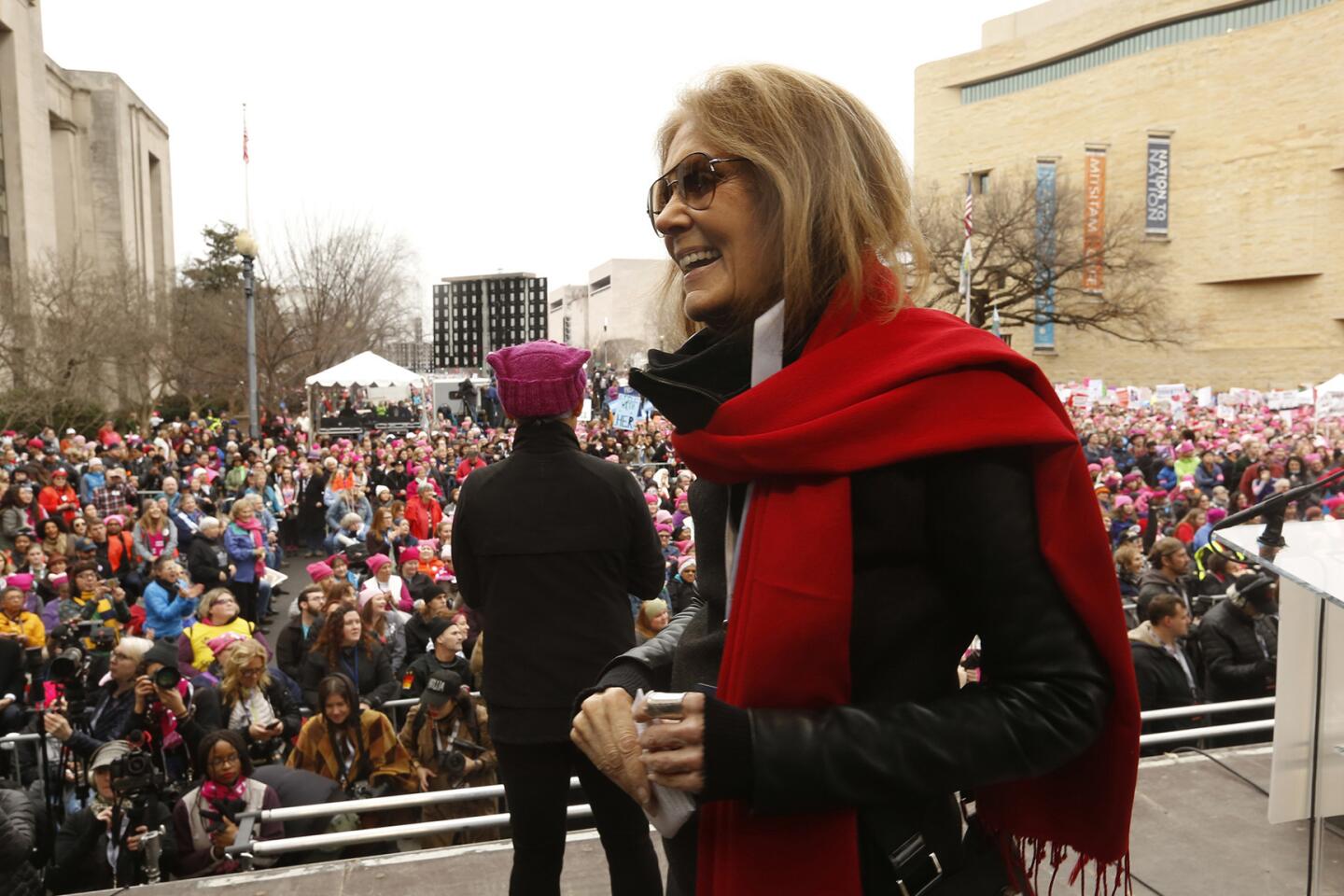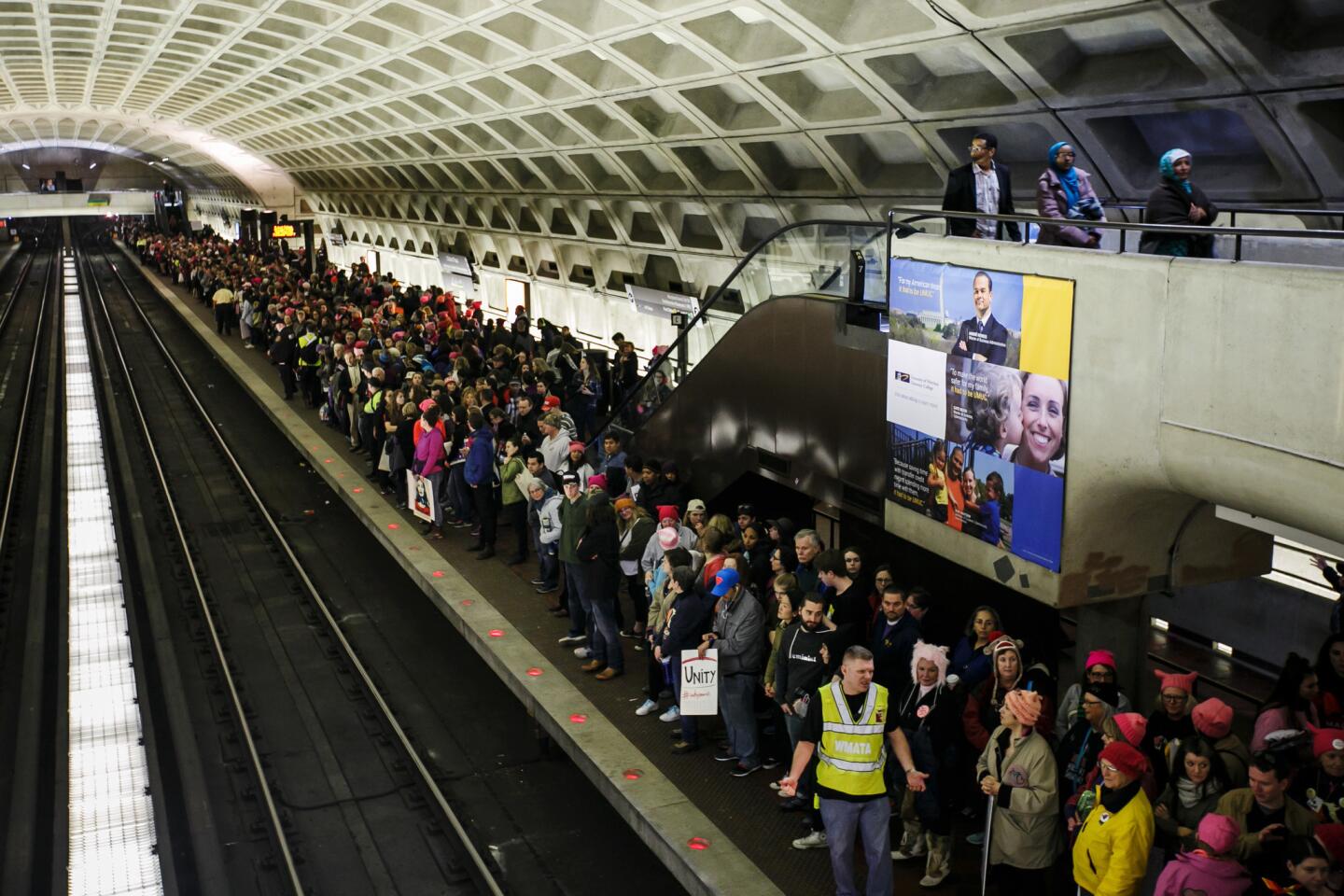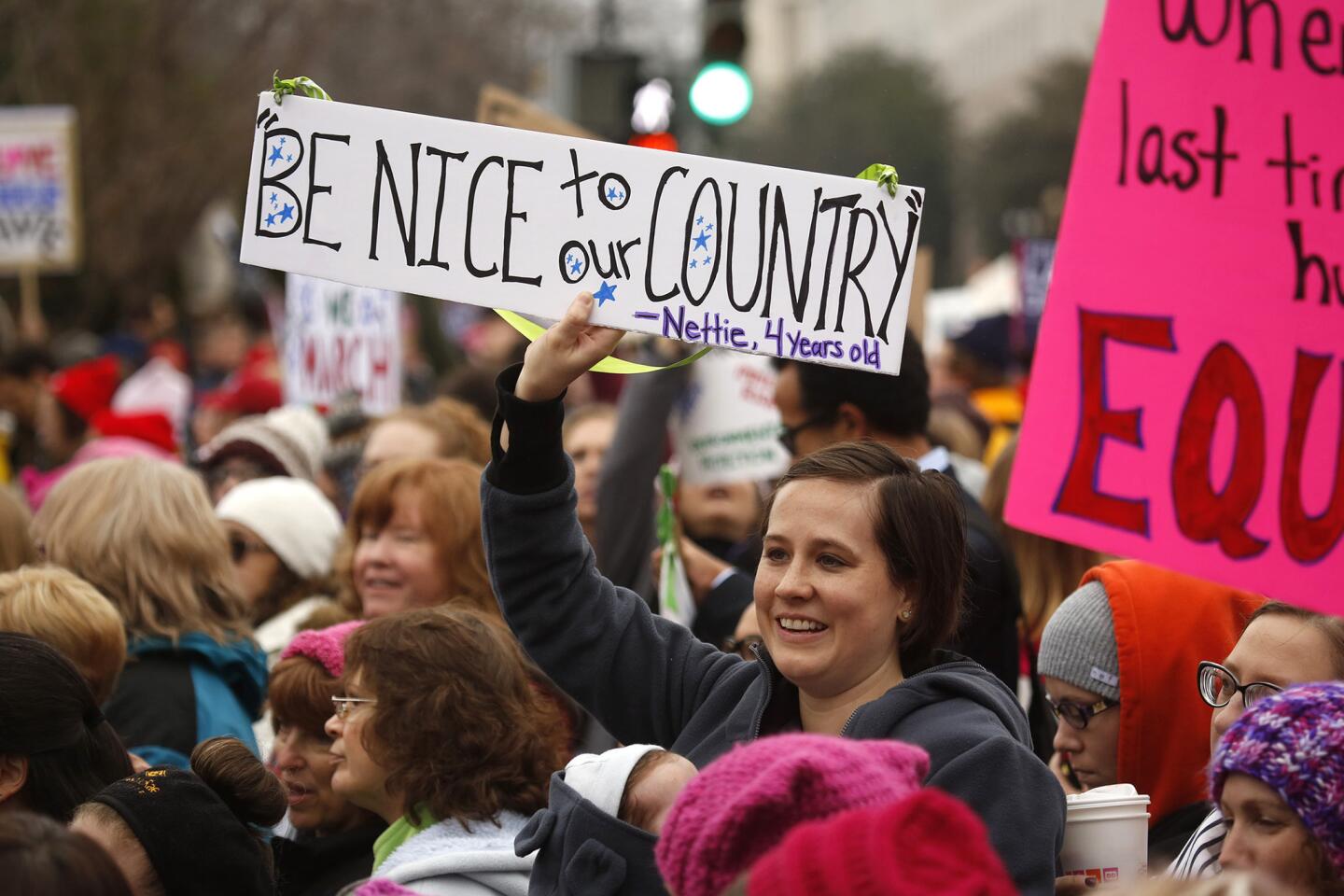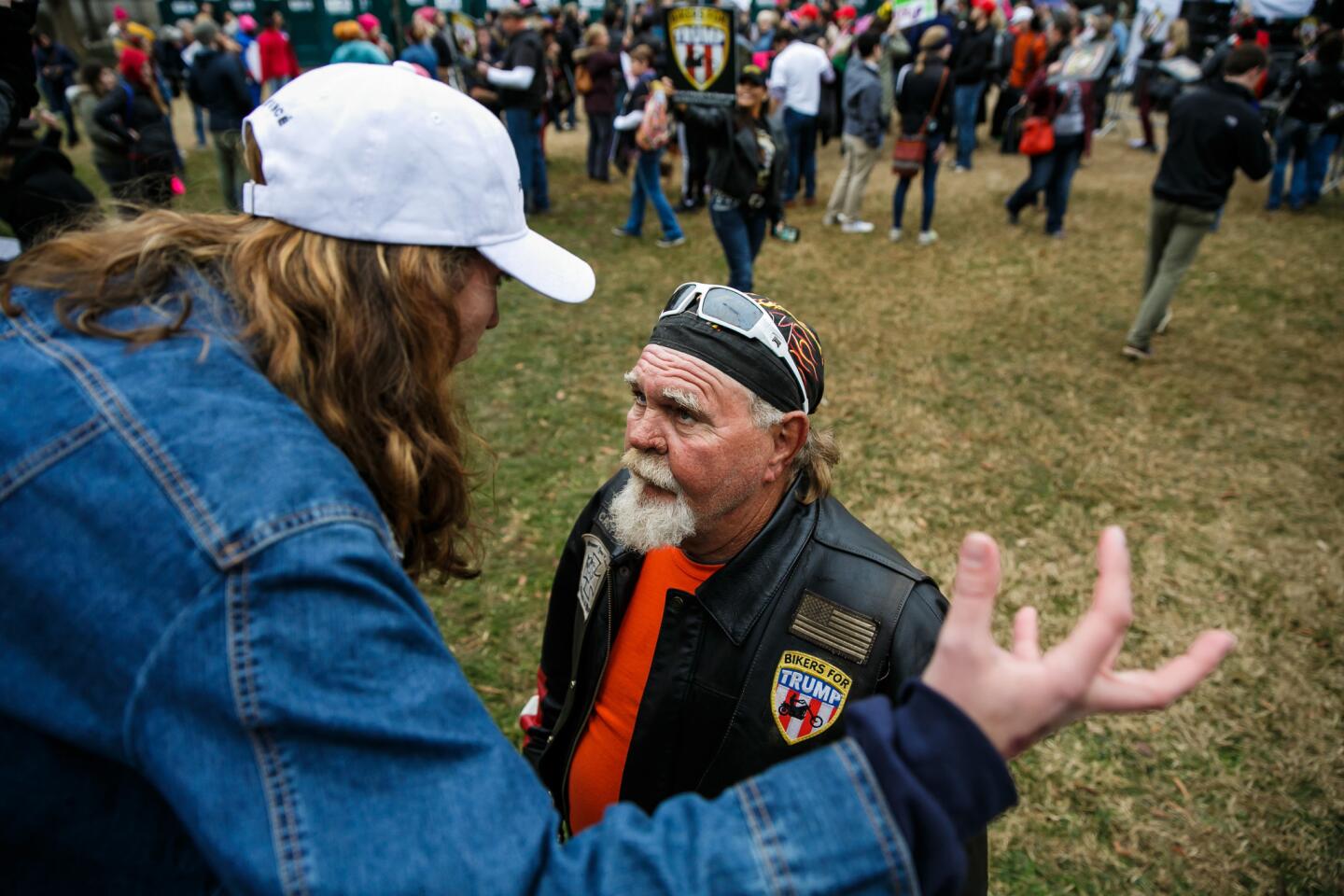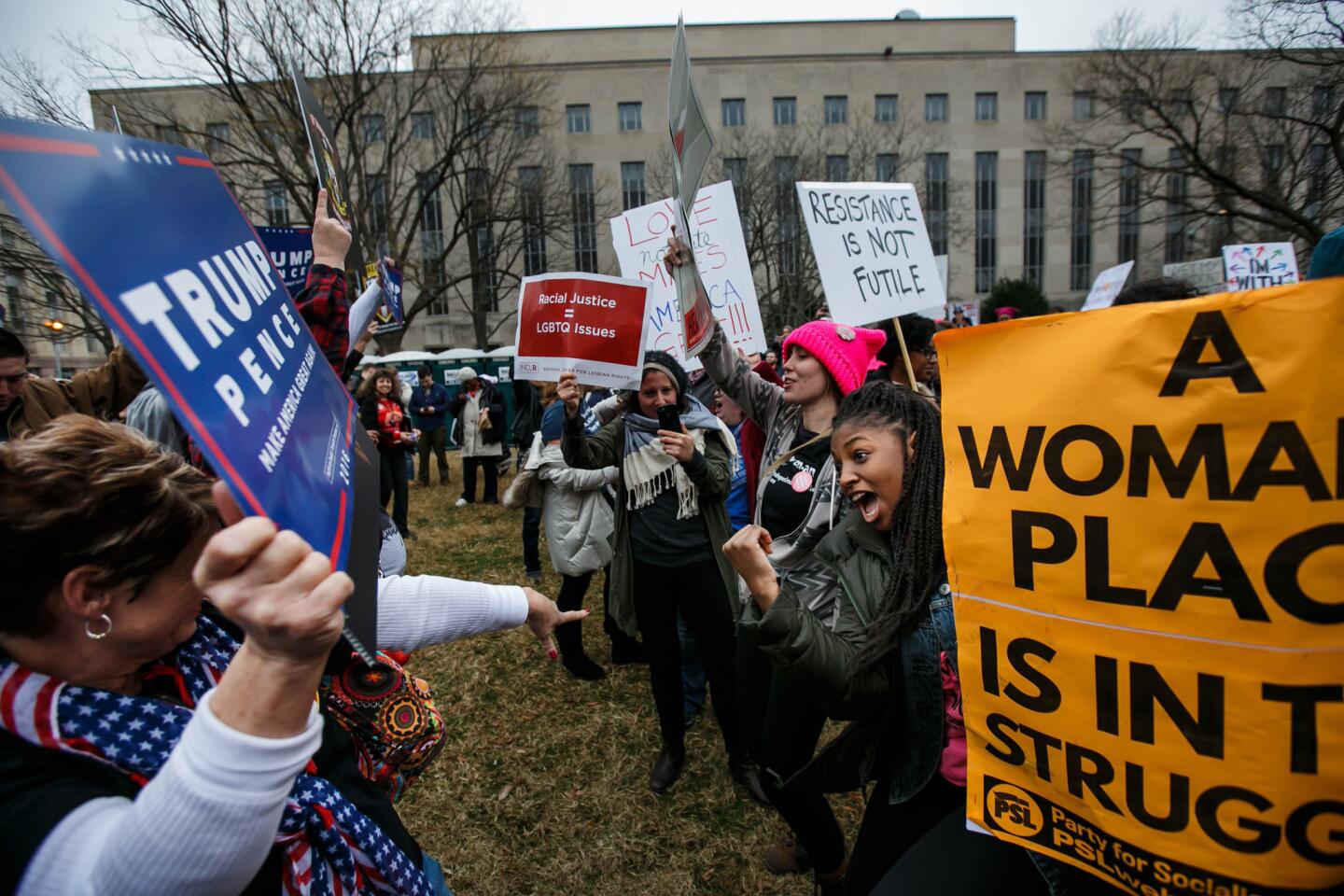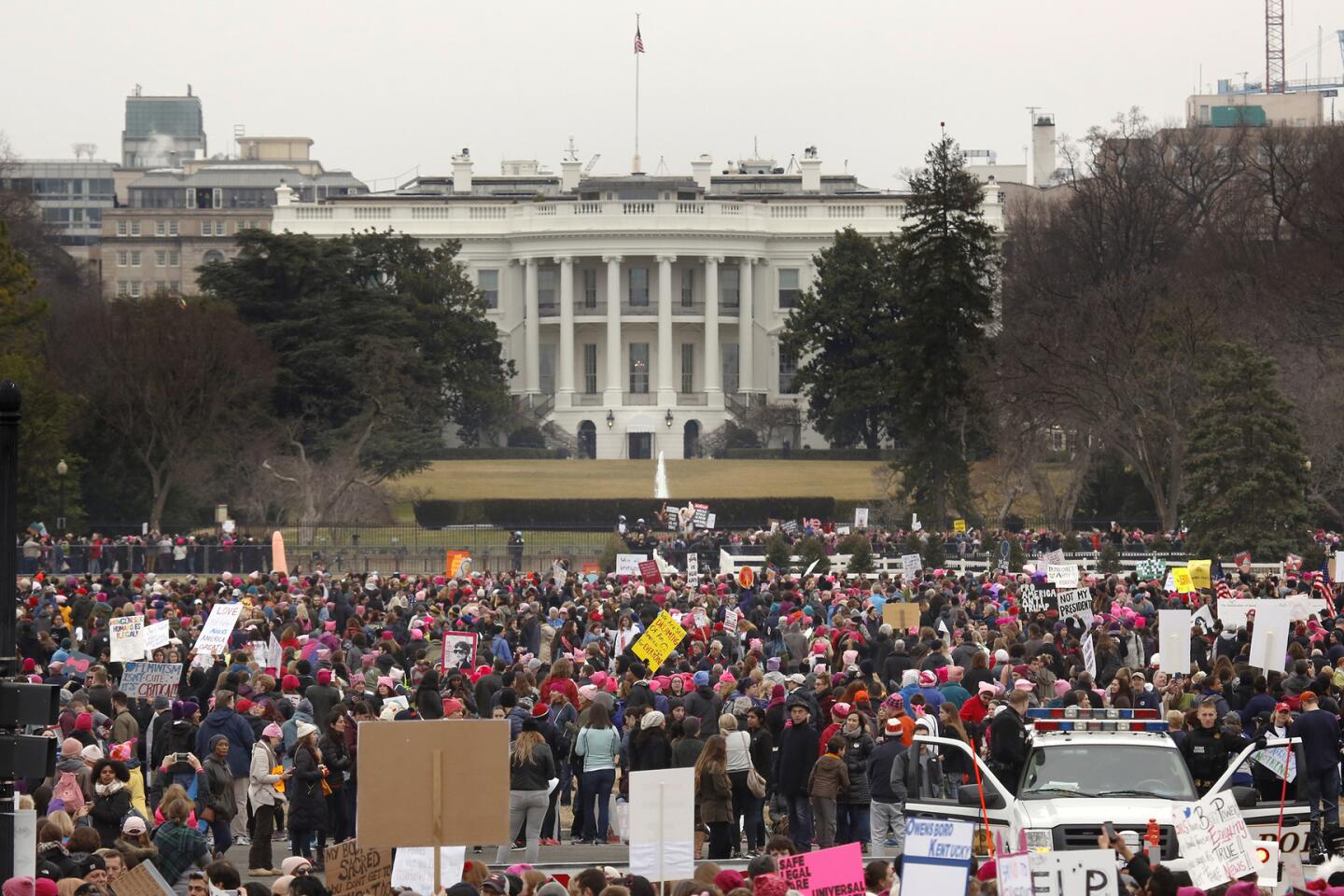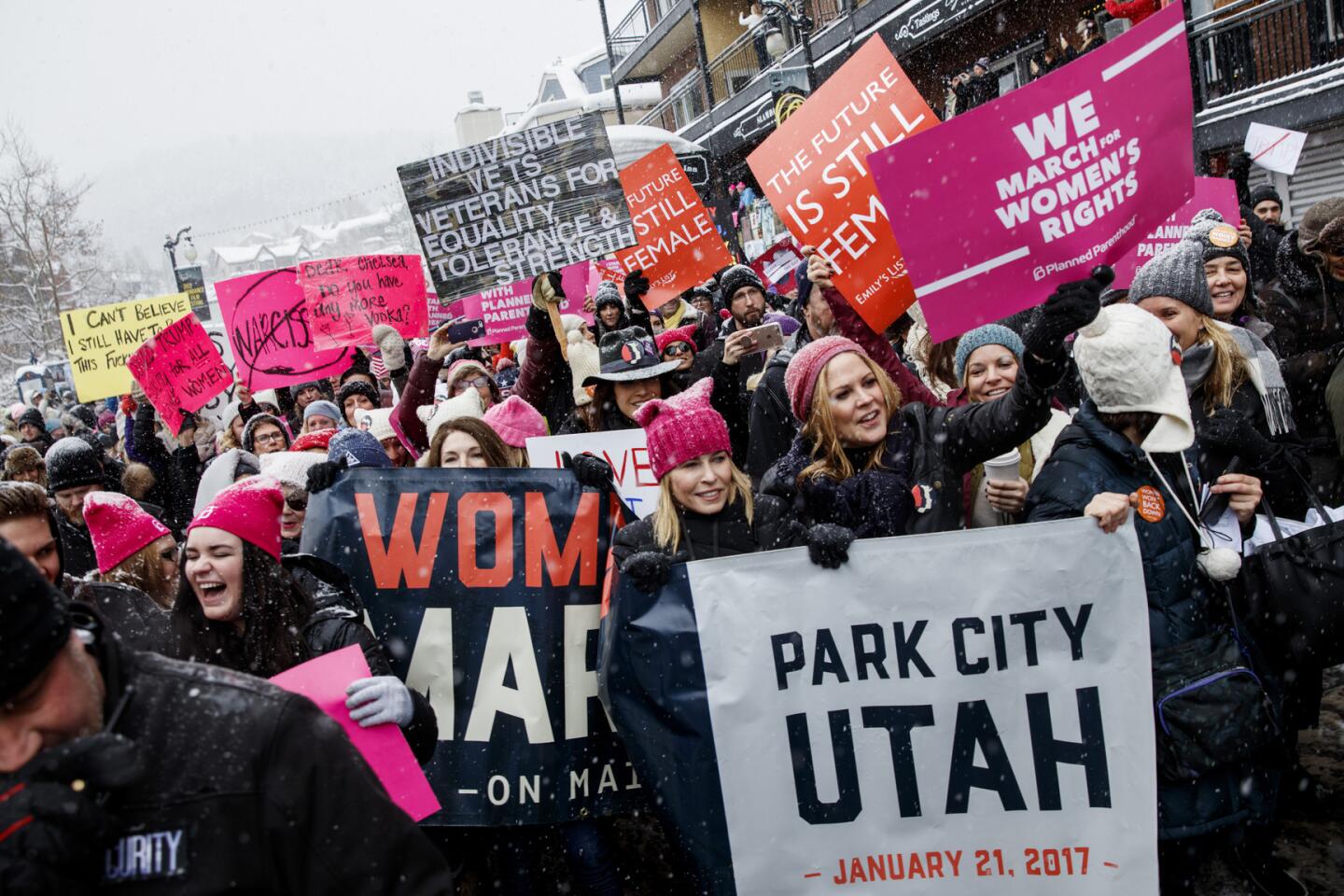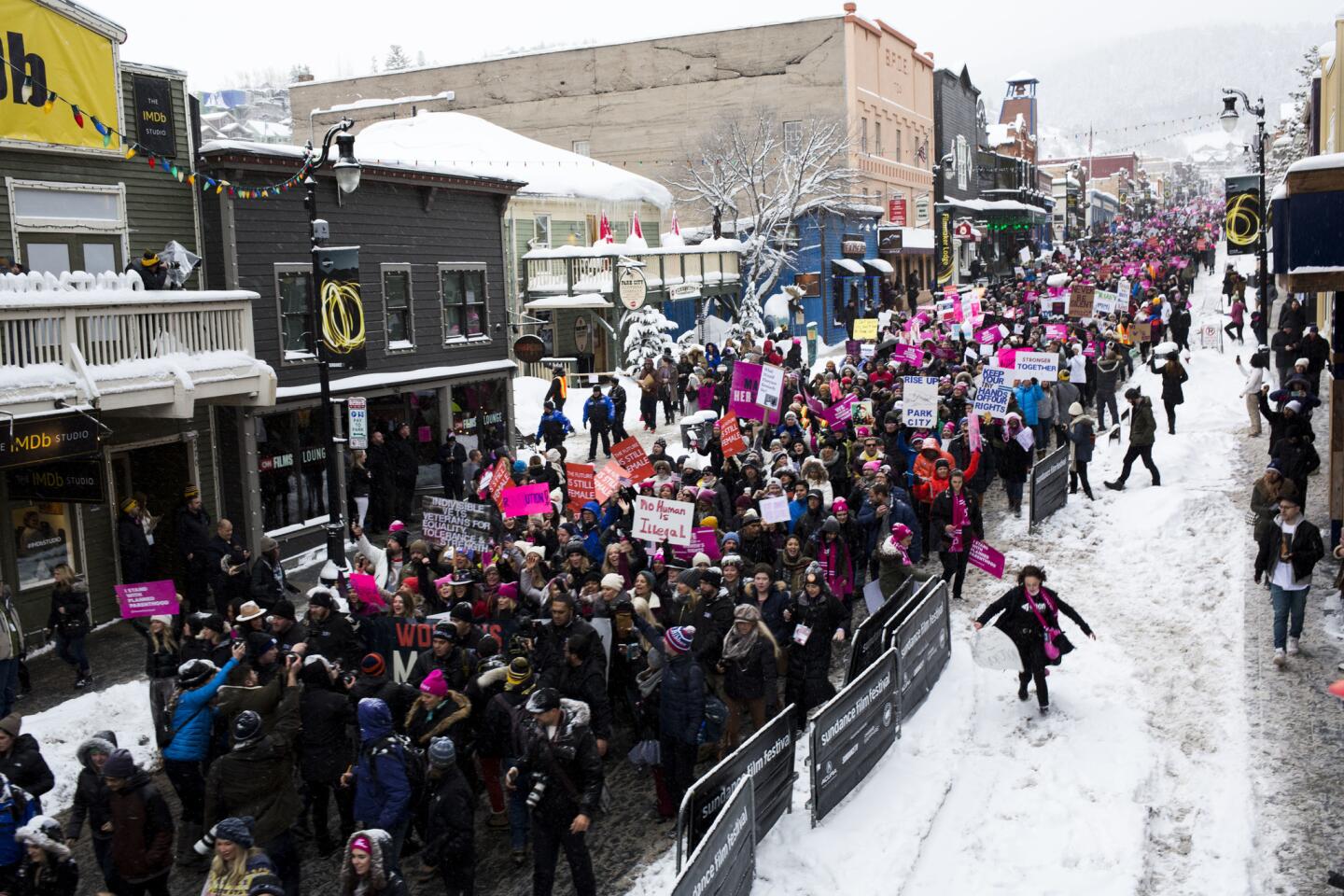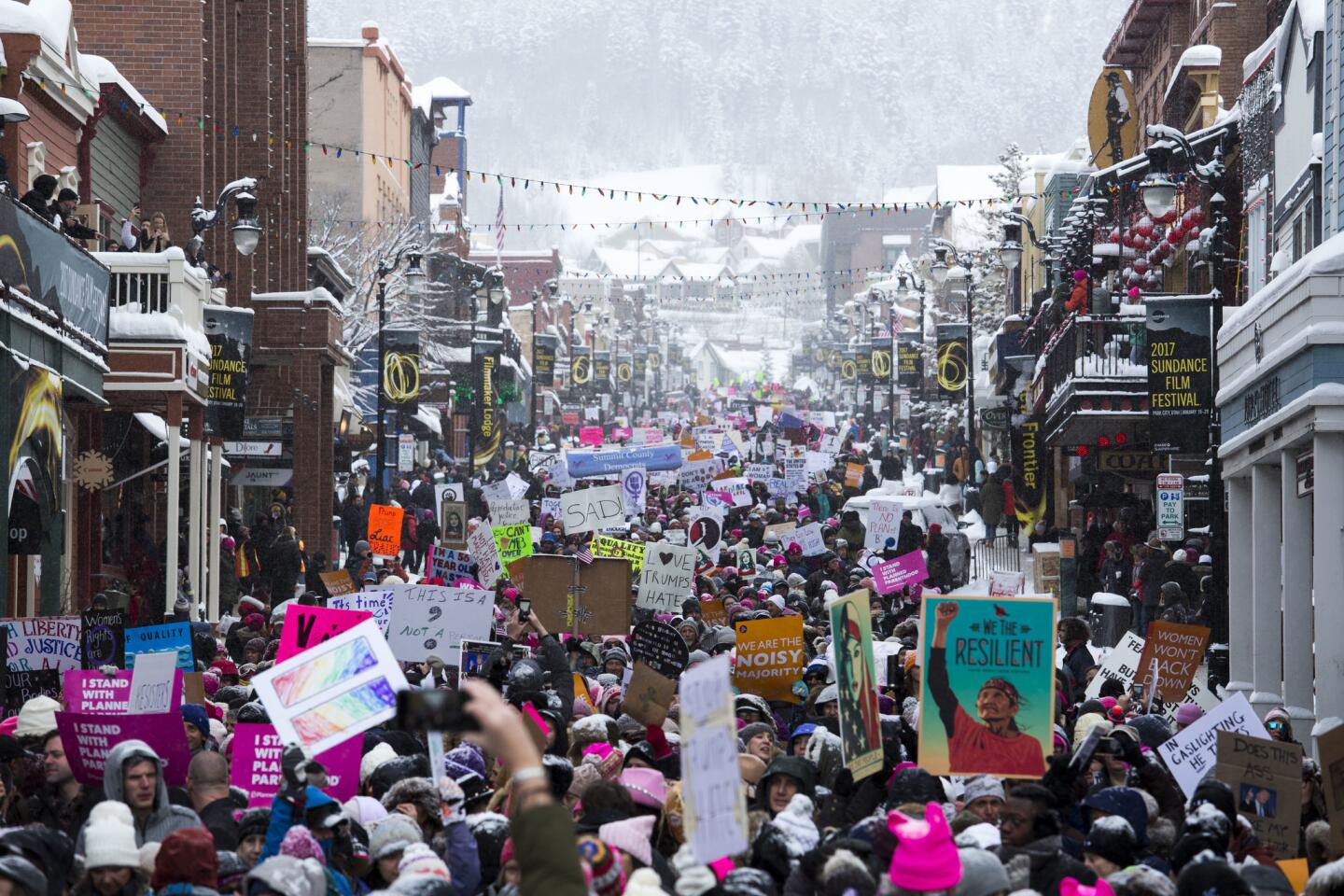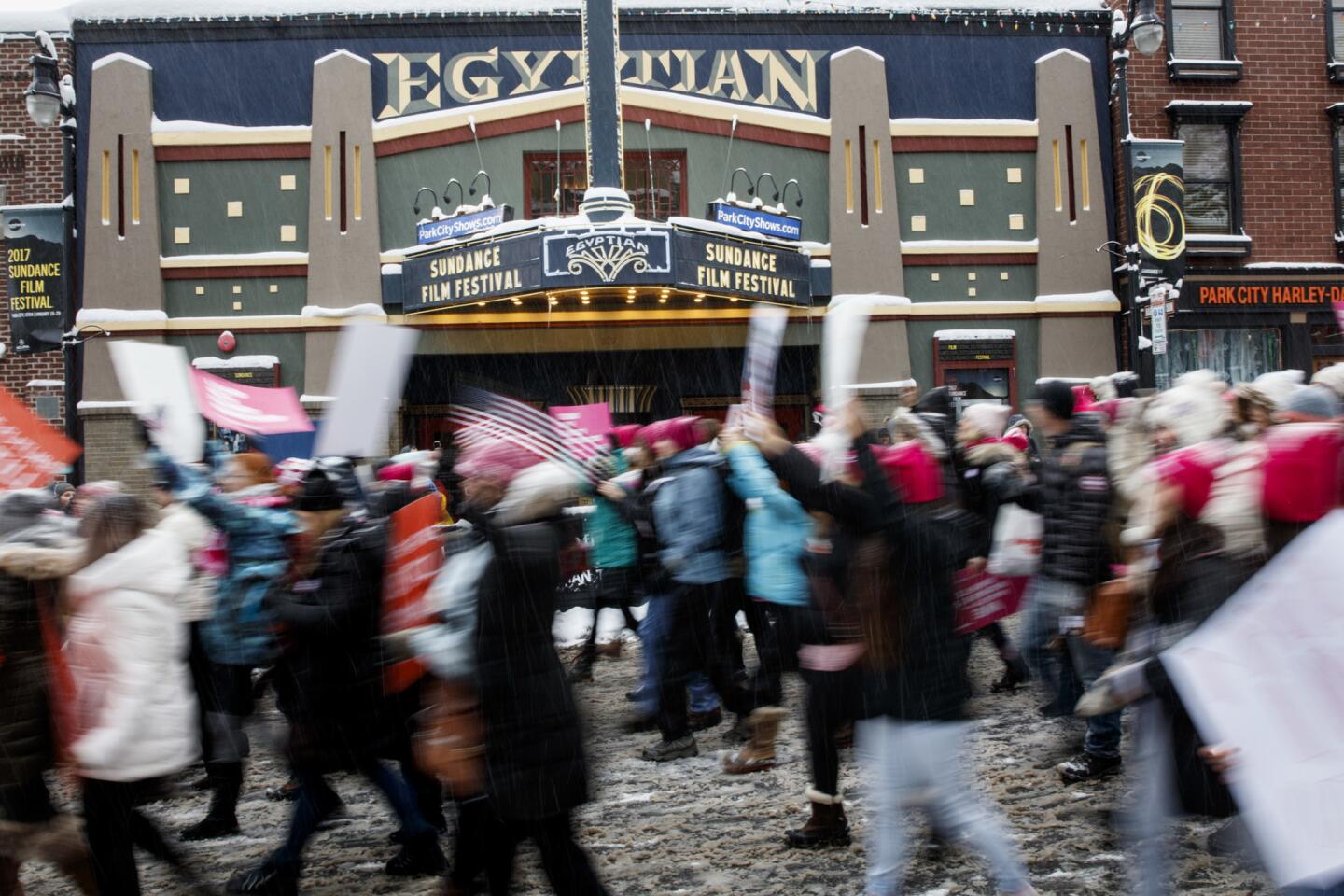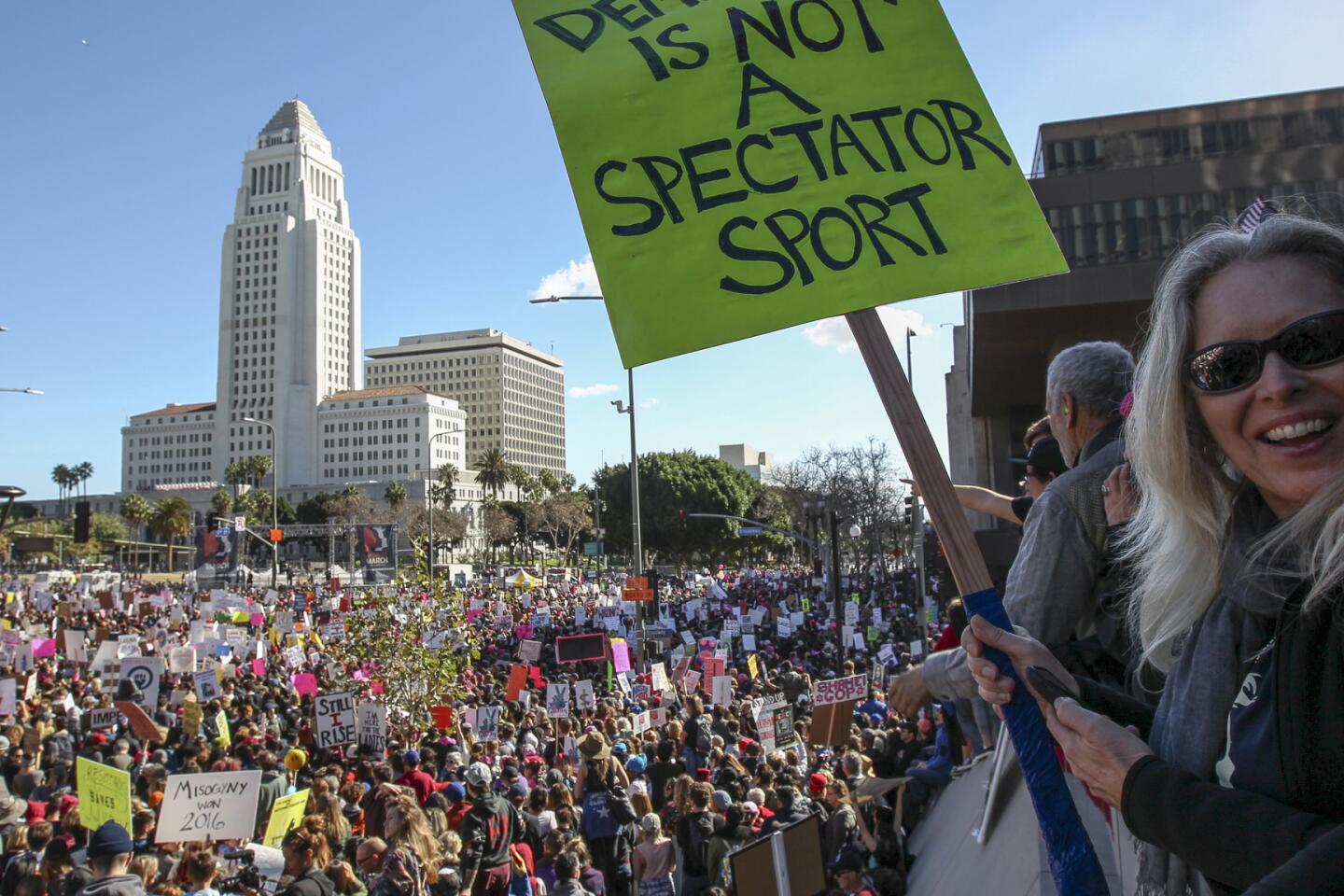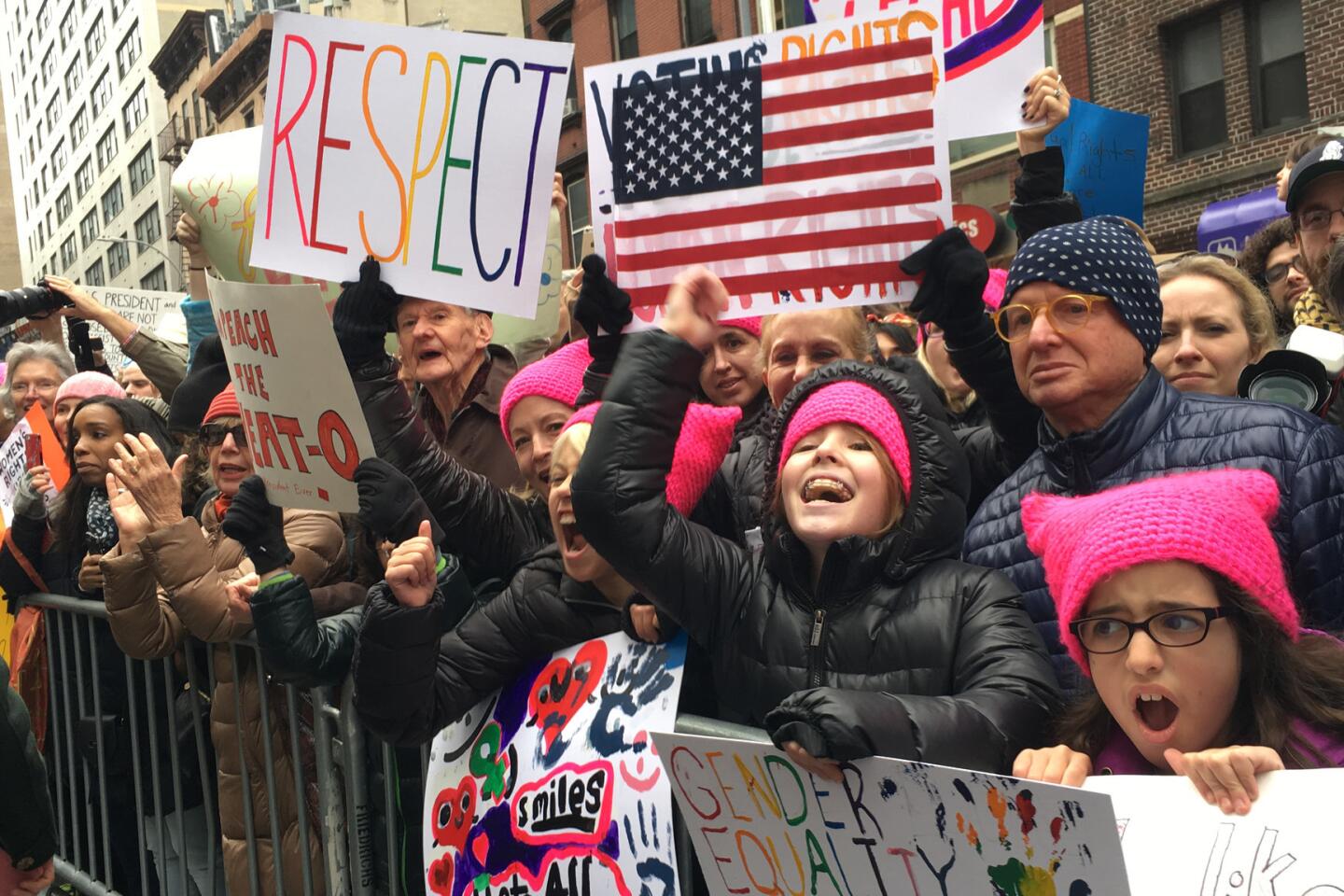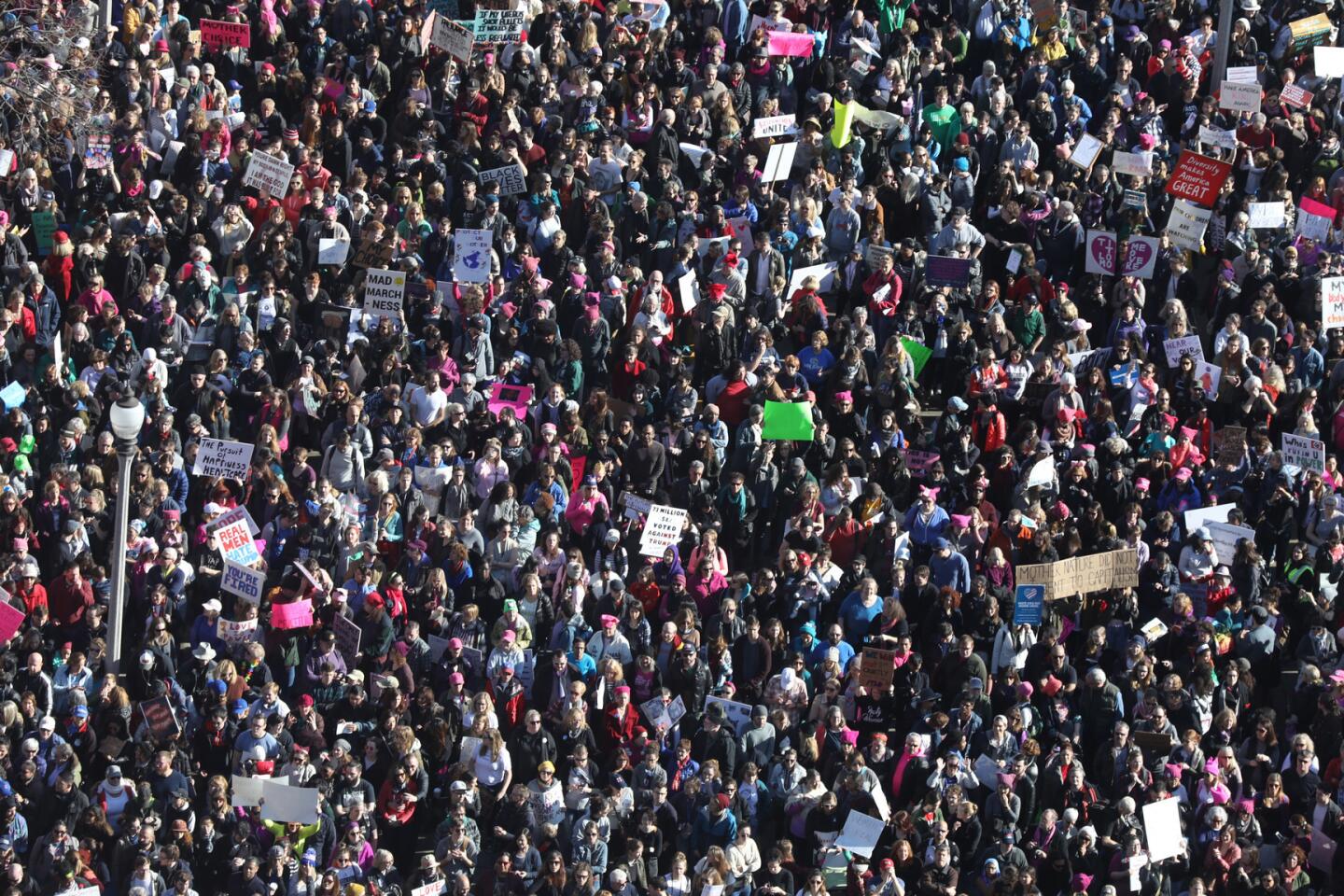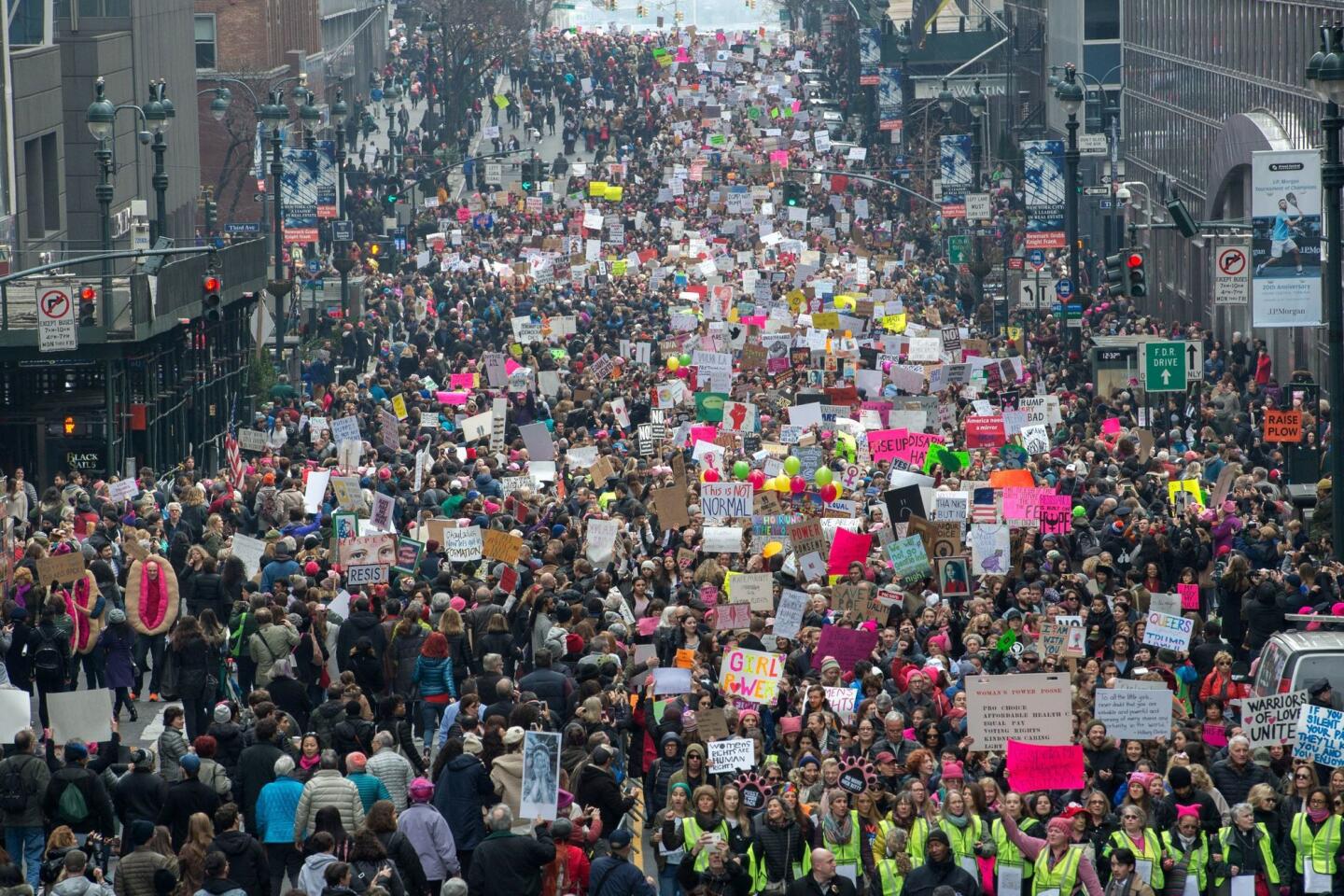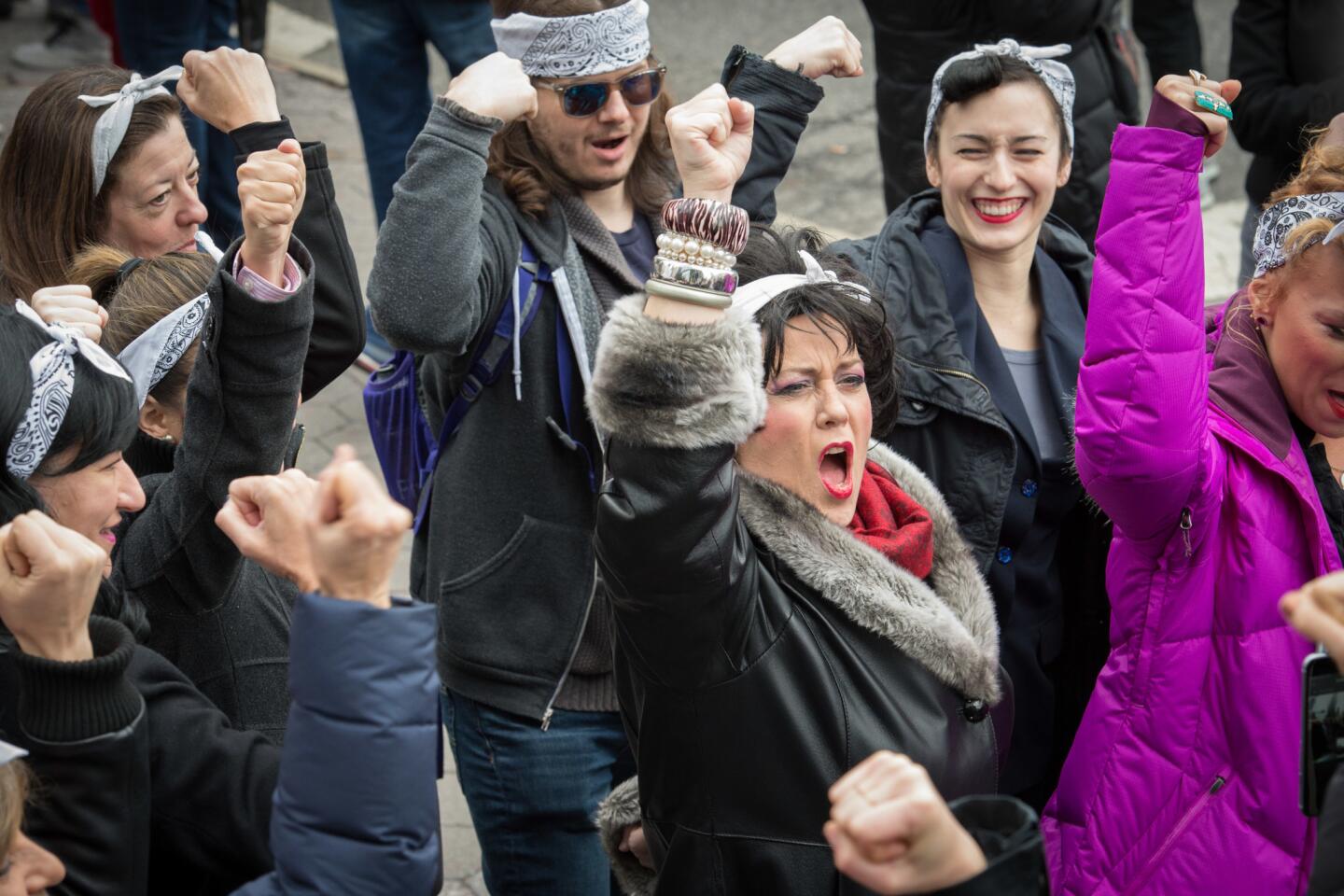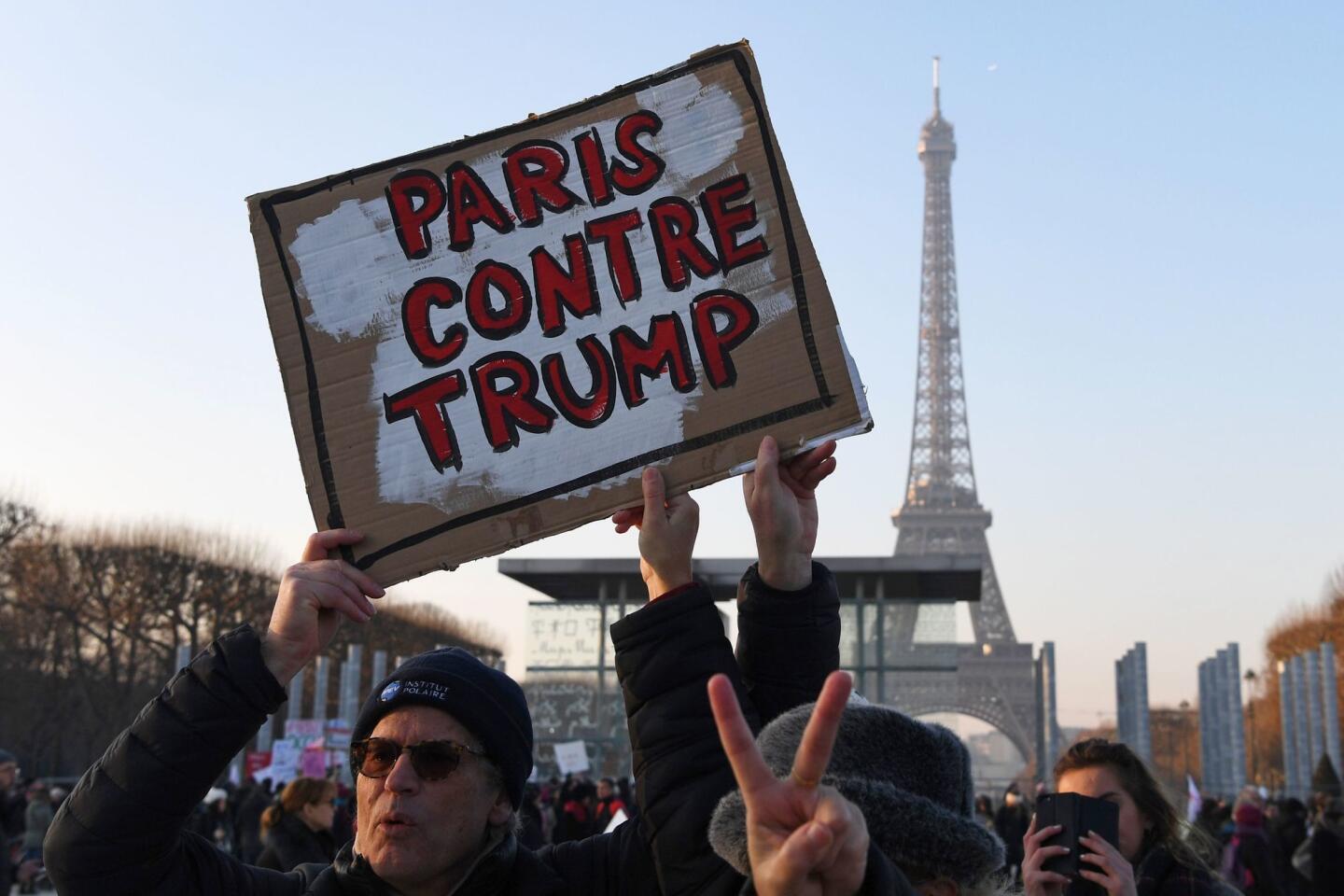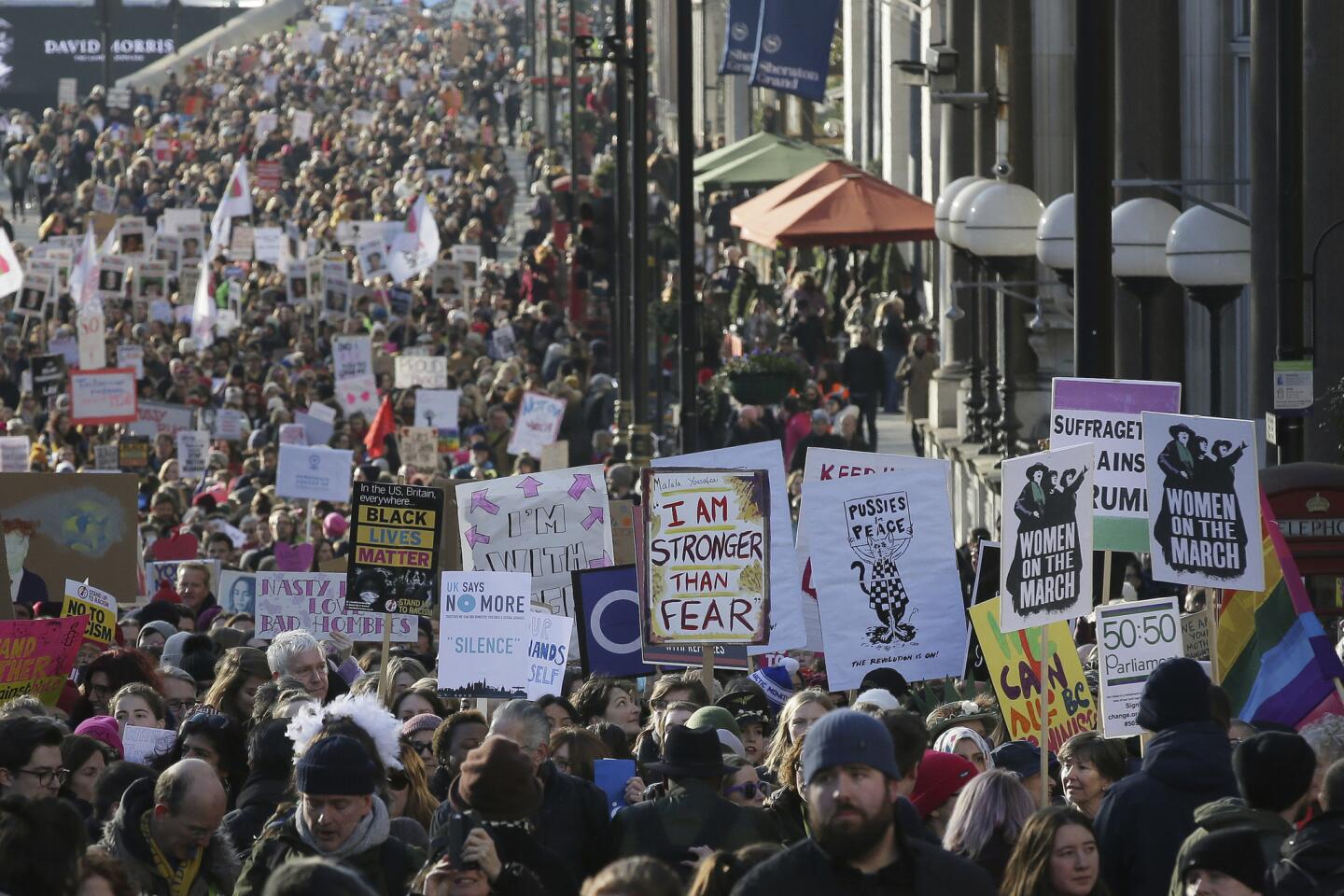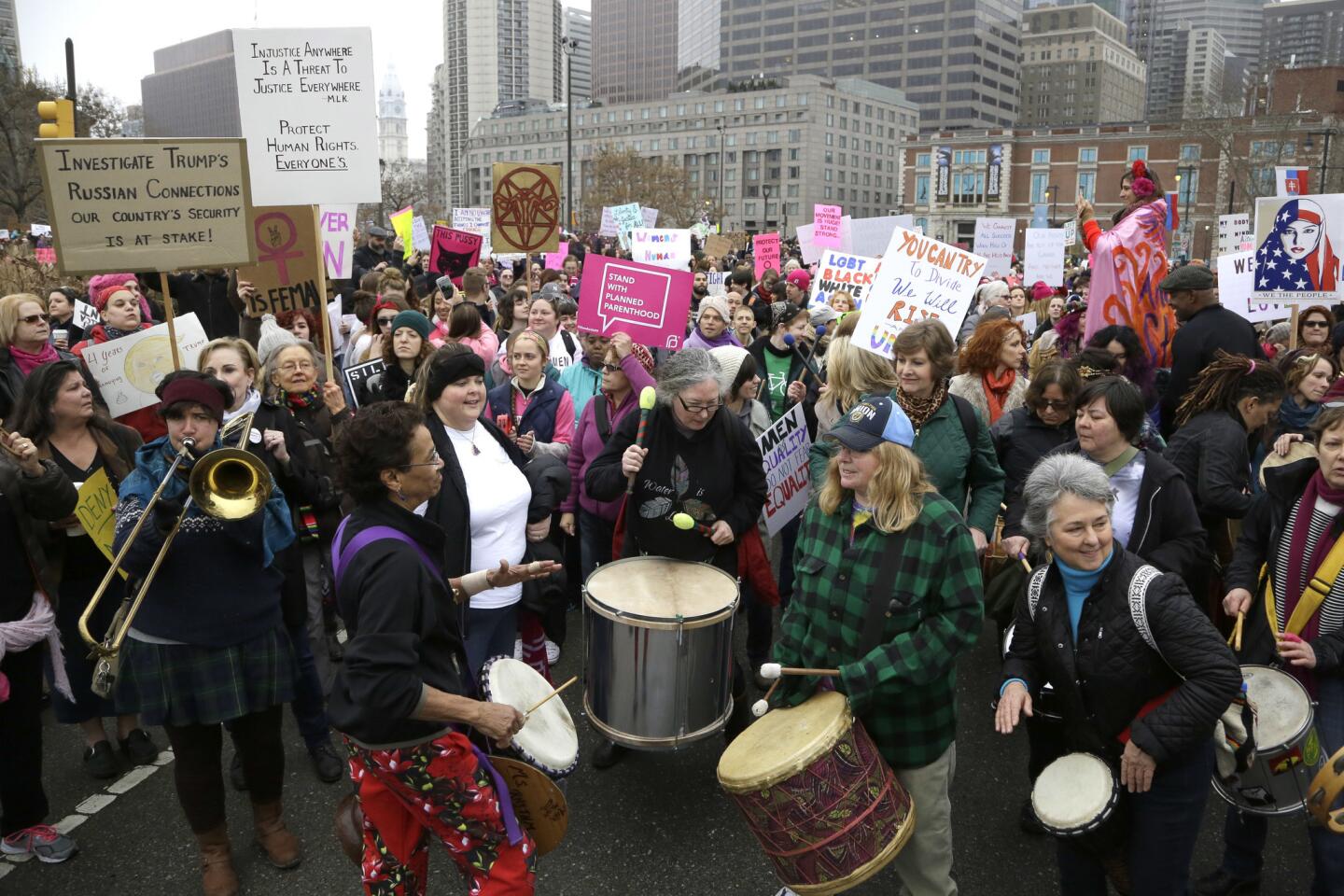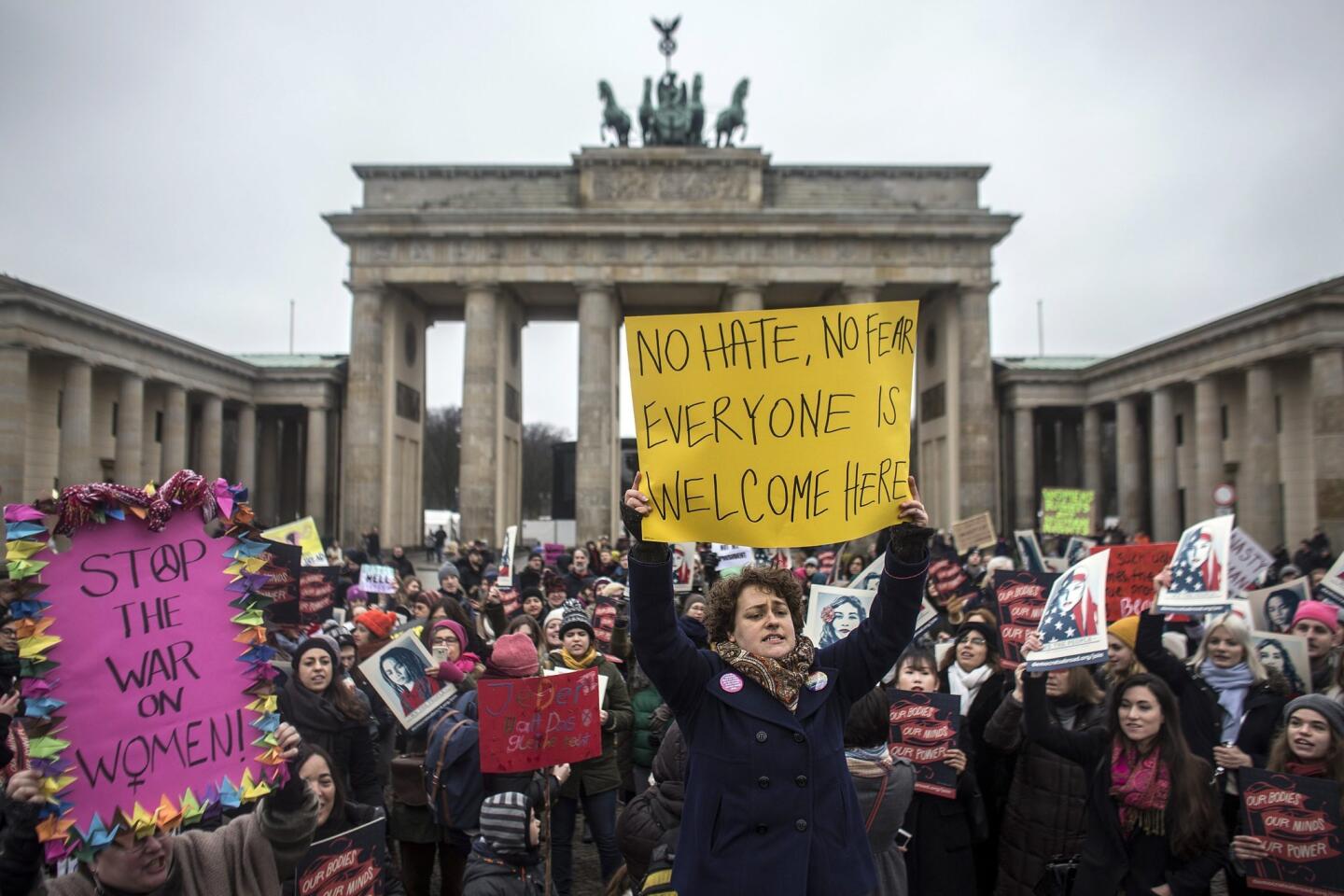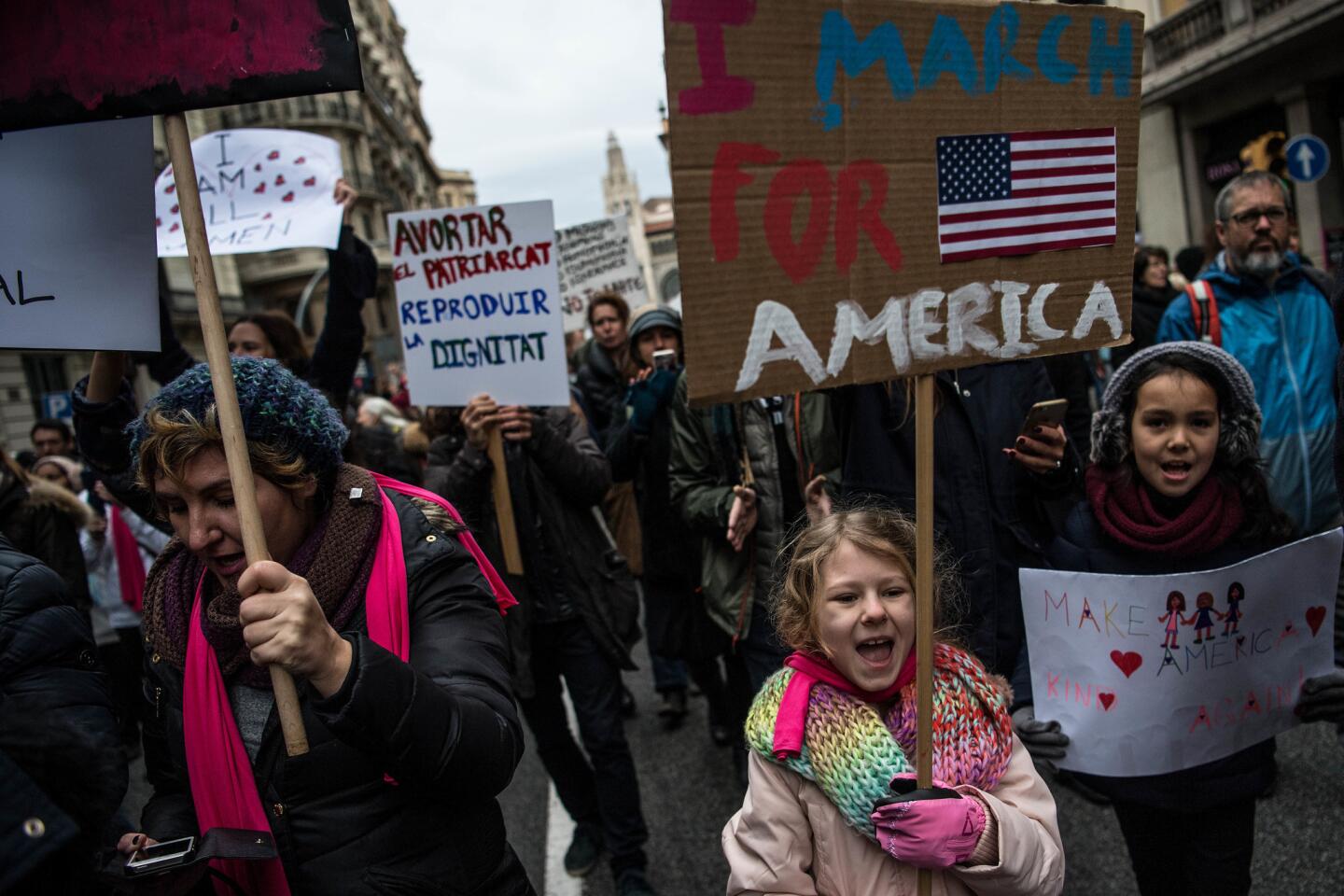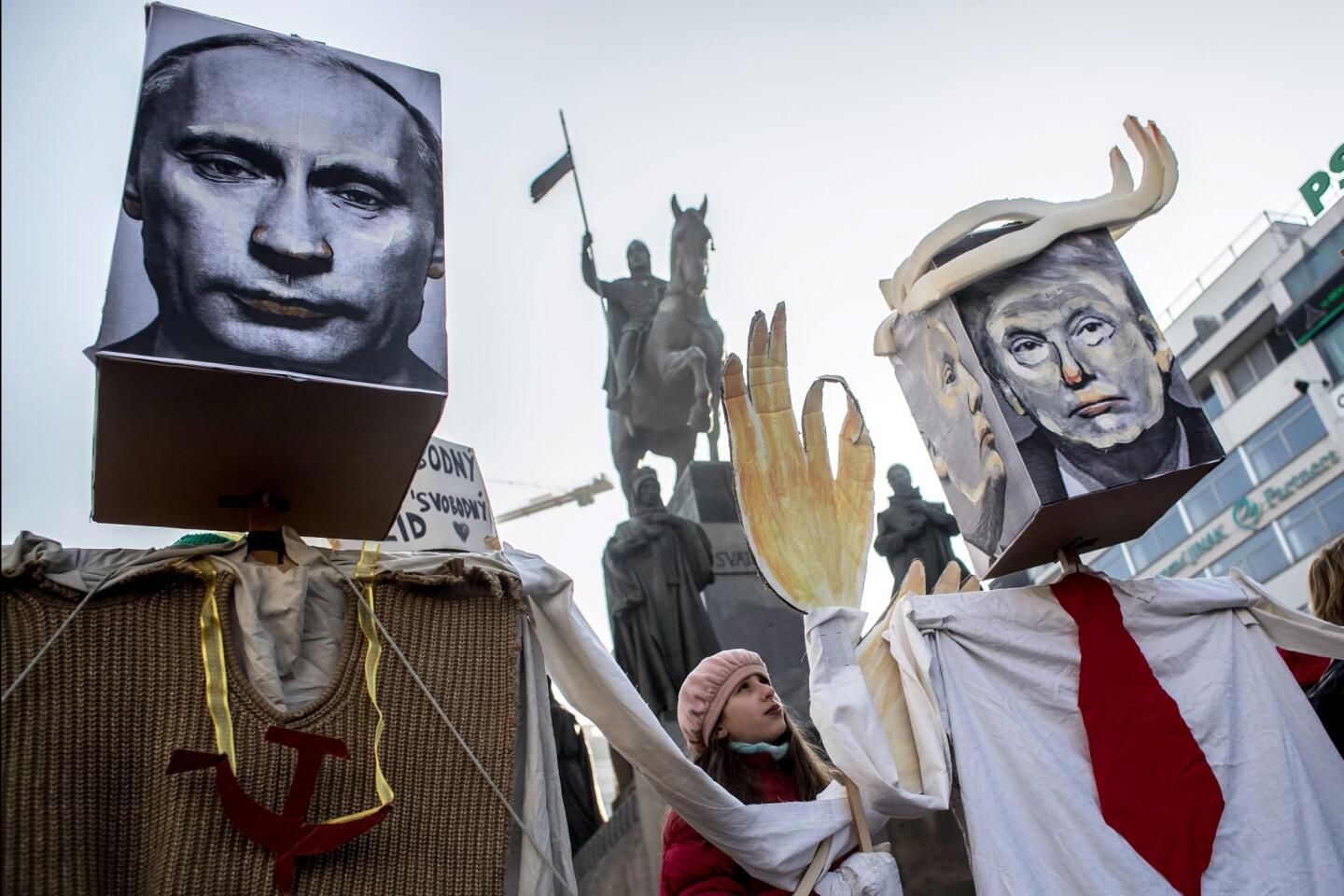Hundreds of thousands of marchers trek through Washington in a passionate display for women’s rights
- Share via
Reporting from Washington — More than a million women and their supporters thronged enormous protest rallies Saturday in Washington and cities around the world, sending a potent message of defiance to President Trump that promised stiff resistance to any curtailment of rights for women and minorities.
In Washington, a crowd estimated by the city’s homeland security chief at half a million overspilled its planned marching route, marking one of the capital’s biggest such gatherings in years. The Washington rally turnout appeared to surpass that of Trump’s inauguration a day earlier — even as the new president accused the news media of underplaying the numbers of supporters attending his swearing-in.
The Washington march also marshaled a show of star power absent from inauguration festivities, with performances by the likes of Alicia Keys and Madonna — with the latter unleashing an expletive-laced exhortation for solidarity that caused live broadcasters to abruptly cut away.
In Trump’s hometown of New York, a crowd estimated at about 250,000 — four times the number expected — surged through the streets of Midtown Manhattan, not far from Trump Tower.
Similar marches were held in 673 other “sister” cities across the U.S. and around the world, including a massive congregation in Los Angeles and large outpourings in Boston, London, Paris and Berlin. Women, with men in close support, gathered from Mexico to South Africa, Israel to Hungary.
“Girl power vs Trump Tower,” read a sign held aloft in Sydney as the crowd chanted: “When women’s rights are under attack, what do we do? Stand up, fight back.”
The day’s rallies brought back echoes of a polarizing and rancorous presidential campaign. Hillary Clinton tweeted her thanks to the marchers, whose ranks included many who had supported her. U.S. Sen. Elizabeth Warren (D-Mass.), addressing a rally in Boston, vowed to do battle for progressive causes and urged marchers to do likewise.
“We can whimper, we can whine, or we can fight back,” Warren said. “Me, I’m here to fight back.”
The Washington marchers came from all over the nation, some on planes, some on charter buses, some in cars after making long overnight drives. The coursing flood seemed to represent the vast expanse of modern America: women and men, white and black, Christian and Muslim, cisgender and transgender, the young and the old.
One small group included three generations of women and girls from the same family, marching together while proudly clutching colorful signs.
Jessica Parker Coleman, 56, came up from Georgia to join the march with her daughter, Amber Coleman-Mortley, 34, and Amber’s daughters, Sofia, 5, Naima, 7, and Garvey, 8.
“When I heard about this one, I wanted to come right away,” Parker Coleman said, adding, “We need positivity back in our country.”
A parade of speakers came to the podium, including Democratic Sen. Kamala Harris of California and a variety of celebrities. Protesters craned their necks to listen, sometimes tramping through bushes and climbing trees to hear the messages broadcast over sound systems scattered around the area.
The crowd was so massive that attendees began marching before the speakers were done. They paraded informally down Constitution Avenue and past the Washington Monument in a noisy procession broken with cheers and chants such as “Love trumps hate.”
They also carried a seemingly endless array of colorful signs, bearing messages like “My body, my choice,” “Weak men fear strong women” and “Michelle Obama 2020.”
The rallies were organized under the rubric of women’s rights that many fear are imperiled under the new administration. But the march’s platform incorporated an array of progressive causes including healthcare, environmental concerns and racial justice.
A sea of pink knitted hats — the movement’s signature headgear — supplanted the red baseball caps worn a day earlier by Trump supporters who had come to Washington for his inauguration.
“Yesterday was their day; today is ours,” said Kim Crawford, 53, of Clinton, Md.
Of Trump, she said: “I’m not sure he’ll hear our voices, but we’re raising them.”
Organizers — and many of the marchers — said they did not want the event’s focus to be opposition to the new president, but rather on the causes they sought to promote.
But disdain for Trump’s past words and actions during a bitterly divisive campaign were on full display, and often reflected in signs that played off explicit language employed in the now-famous video in which Trump talked about sexually assaulting women.
“Don’t even THINK of grabbing mine,” read one of the tamer versions. Others playfully used feline imagery to rebuke Trump’s crude language: “Women and cats will do as they please,” another said.
Many said they were braced for an unraveling of rights and freedoms they had come to take for granted.
“I’m pretty disheartened,” said Louise McAfee, 38, who traveled to Washington from Rochester, N.Y., spurred by her concerns about access to healthcare. “But I’m also pretty hopeful.”
While the great majority of the marchers were female, men turned out in considerable numbers as well. Jacob Osterman, 24, traveled from Boston with a group of friends to take part.
“I love and care about the women in my life, and this is a way to show that,” he said. “Women are part of humanity, like all of us. How can anyone not understand that?”
Bits of overheard conversation reflected long journeys: “… at 3 a.m. yesterday — no, wait — it was the day before” or “… and that was before we even got on the road!”
Creature comforts were hard to come by. Long lines stretched out of coffee shops and fast-food joints close to the gathering point on the National Mall. One woman asked her friend, only half jokingly, “Are we going to have to rent a room to get a bathroom?”
The atmosphere was simultaneously lighthearted — “Oh, I’m wearing my pink hat, so of course you’ll be able to find me!” one woman joked to her companion — and somber, as many pondered what lay ahead.
“People are really frightened about losing their health insurance,” said Gretchen Stanford, from Alexandria, Va., just across the river from the District of Columbia. “And frightened about lots of other things.”
A contingent of young women and girls in hijab waved to passers-by as they headed to the rally site, making their way under a highway overpass. Fifteen-year-old Rudy, wearing a white headscarf, was too shy to give her full name but said with a smile: “I want to be seen.”
The turnout for the march was a show of force that gave signs of exceeding the attendance of the presidential inauguration a day earlier. Washington Metro trains that had been lightly used Friday were jammed so full of protesters with signs and pink hats on Saturday that crowds on platforms had to wait for more trains. Outside the Capitol building, a constant stream of thousands of cheering women emerging from Metro stops headed for the march’s starting location.
Trump, meanwhile, stung by reports that attendance at his inaugural had been sparse compared with President Obama’s initial inauguration in 2009, insisted that “a million, a million and a half” people had turned out Friday — an estimate well in excess of nearly all others. During an appearance at the CIA, Trump complained that one TV network “showed an empty field” on inauguration day and reported that 250,000 people had attended the ceremony.
“Now that’s not bad, but it’s a lie,” he said.
Ridership statistics on Metro — the main means of transport into central Washington — showed about 193,000 people had ridden the system by 11 a.m. on inauguration day, compared with 317,000 four years ago and 513,000 for Obama’s first inauguration.
Ridership on Saturday was 275,000 by 11 a.m., with huge lines of people still trying to get into many Metro stations.
Actress America Ferrera got the rally off to a rousing start, invoking her birth in Los Angeles to Honduran parents.
“It’s been a heartrending time to be both a woman and an immigrant. Our dignity, our character, our rights have been under attack,” she told the crowd. “But the president is not America. We are America.”
Gloria Steinem, a grande dame of the feminist movement, scorned the notion of patriarchy, declaring, “No more asking Daddy!” Actress Scarlett Johansson mounted a passionate defense of Planned Parenthood, threatened with defunding under the new administration.
Headline performers in Washington included Janelle Monae, Samantha Ronson, the Indigo Girls and Mary Chapin Carpenter.
Many of the marchers were noncelebrities who simply said they wanted to share a moment of history.
Michelle Pierson of Van Nuys and Nicole Myers of Woodland Hills talked their husbands into caring for their respective children so the two women could spend the week protesting in the nation’s capital.
“We had to do something to deal with our frustration, our sadness, our rage,” said Pierson, 38, a stay-at-home mom.
Myers says she has a 10-year-old son.
“I don’t want him to think someone could speak like that and be president,” said the 40-year-old, who owns a picture-framing shop.
Some marchers said they were worried about scenes of unrest associated with inaugural commemorations Friday. Small groups smashed windows and set fires to protest against Trump, and there were some tense Inauguration Day exchanges between Trump backers and opponents.
“Whatever happens, we have to keep it peaceful,” said Leahn Murray, a 33-year-old emergency medical technician from Buffalo, N.Y., who was stenciling a sign reading, “Resistance is built on hope.”
“We can’t use violence to make our point,” she said, “because the whole point is that people need to be safe.”
Times staff writers Matt Pearce, Seema Mehta, Hailey Branson-Potts, Meredith Woerner and David Lauter in Washington, D.C.; staff writers Molly Hennessy-Fiske in Houston, Barbara Demick in New York, Nigel Duara in Scottsdale, Ariz., David Montero in Las Vegas, William Yardley in Seattle and Patrick J. McDonnell and Kate Linthicum in Mexico City; and special correspondents Jenny Jarvie in Atlanta, Christina Boyle in London, Joshua Mitnick in Tel Aviv and Erik Kitschbaum in Berlin all contributed to this report.
Twitter: @laurakingLAT
Twitter: @mattdpearce
ALSO
To march or not? Some women are staying away from Women’s March because of a rift over abortion
Beware the politician with simple answers. Trump still divides, and there’s a lot at stake
Raw, angry and aggrieved, President Trump’s inaugural speech does little to heal political wounds
UPDATES:
5:20 p.m. The article was updated with information on other marches and background on crowd estimates.
1:35 p.m.: This article was updated a progress report on the march in Washington and additional interviews with protesters.
11:05 a.m.: This article was updated with additional details throughout.
10:20 a.m.: This article was updated with revised crowd estimates.
This article was originally published at 8:15 a.m.
More to Read
Get the L.A. Times Politics newsletter
Deeply reported insights into legislation, politics and policy from Sacramento, Washington and beyond. In your inbox twice per week.
You may occasionally receive promotional content from the Los Angeles Times.
